Some of us might think to ourselves, why would anyone like bugs, they’re icky, but you’d be surprised just how much there is to be fascinated about when it comes to insects in general.
Sure, Animal Crossing might have already helped change your perspective on bugs, but there are surely more ways than one to convince people bugs aren’t all that bad and are actually a beautiful and meaningful part of our ecosystem.
Meet Duran Jay, an artist who does eye makeup inspired by exotic bugs, insects, and anything that fits the invertebrate category. On her dedicated Instagram page, she posts side-by-side comparisons of her colorful eye makeup designs and the bugs that inspired them.
Scroll down to check out some of her best and most mesmerizing work to date, and while you’re down there, read up on our interview with Duran and why not vote and comment on the makeup designs, or the inspirations behind them, that you enjoyed the most!
More info: Instagram
#1
Metallic wood-boring beetle (Anthaxia suzannae).
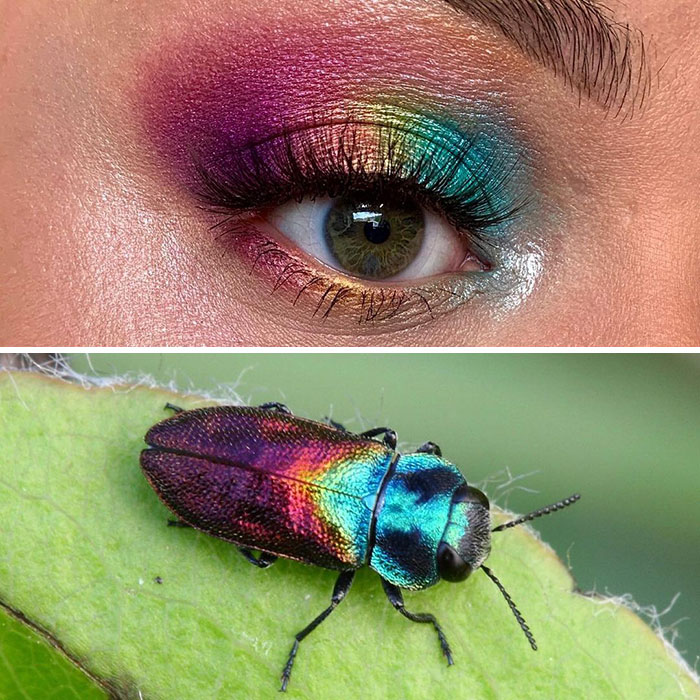
Image credits: Duran Jay / Entomakeup
#2
Roseate emperor (Eochroa trimenii).
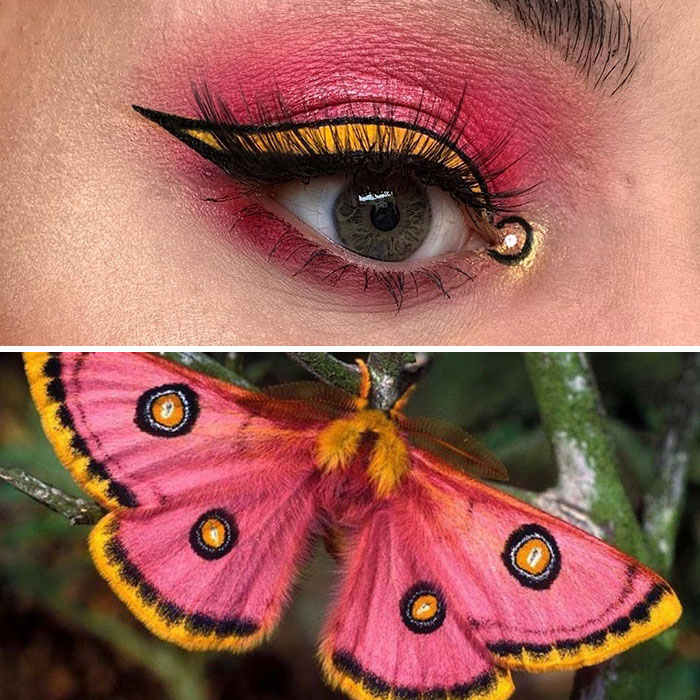
Image credits: Duran Jay / Entomakeup
#3
Purple-stained daggerwing (Marpesia marcella valetta).
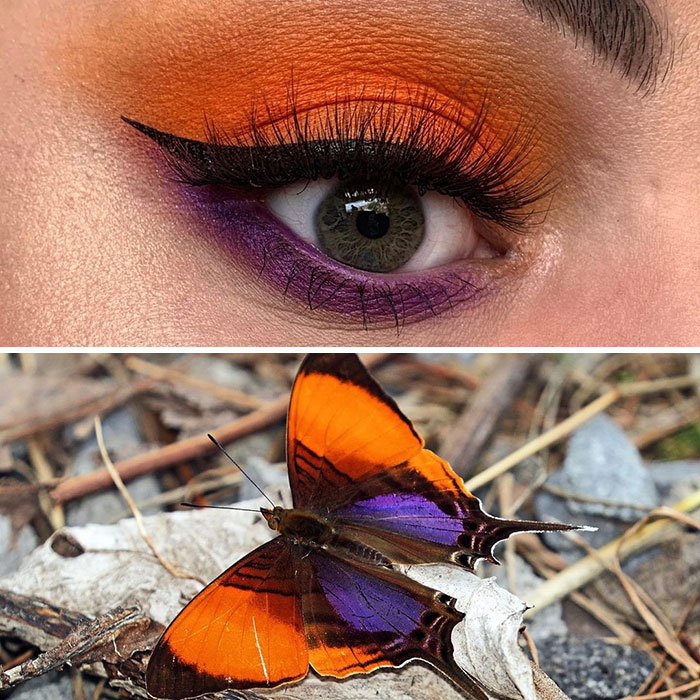
Image credits: Duran Jay / Entomakeup
Duran Jay is a UK-based makeup artist who’s also an avid bug enthusiast. Put them together and you’ve got yourself a unique combination that is sure to draw an eye.
“I’ve had an interest in bugs for many years, but only somewhat recently grown to appreciate the true diversity they represent,” said Duran. “I think we’re conditioned from an early age to be afraid of insects or see them as pests, but there is beauty right beneath our feet if we only take a moment to look for it.”
She continued: “With my makeup, I try to showcase some of the most beautiful species like butterflies or jewel beetles, but also give a little appreciation to those that aren’t as pretty and typically evoke a bad response, like ants or silverfish. I’ve always enjoyed being creative with my personal style and Entomakeup really just started as a bit of fun and a bit of a challenge for myself during the boredom of lockdown. I never imagined that anybody would take any interest in it or that it’d have the incredible response it’s had so far!”
#4
Stink bug (Edessa rufomarginata).
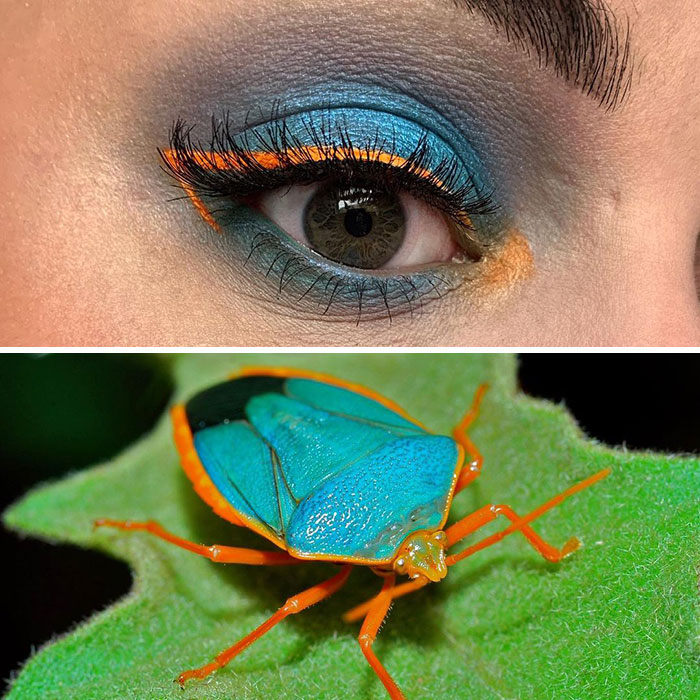
Image credits: Duran Jay / Entomakeup
#5
Green dragontail (Lamproptera meges).
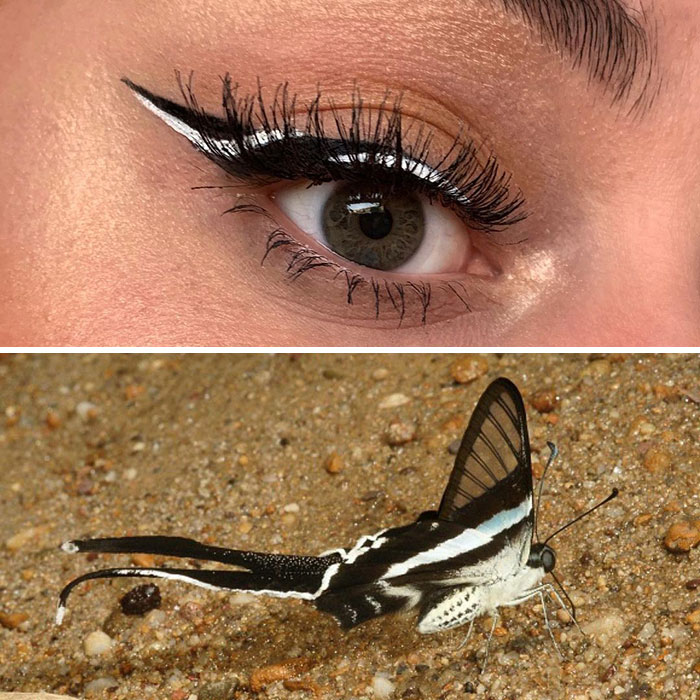
Image credits: Duran Jay / Entomakeup
#6
The Chilean tarantula (Grammostola porteri) belongs to the Grammostola genus, which contains 21 species of New World tarantula. New Worlds are those that are native to the Americas (in this case, South America) and are typically recommended as the best choice for beginner hobbyists due to their very mild venom that poses little threat to us humans.
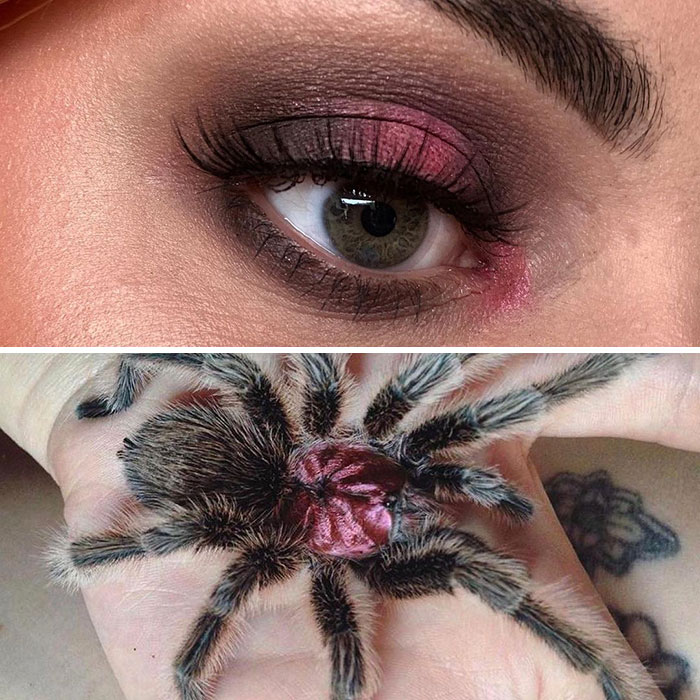
Image credits: Duran Jay / Entomakeup
#7
Shield-backed jewel bug (Poecilocoris rufigenus).
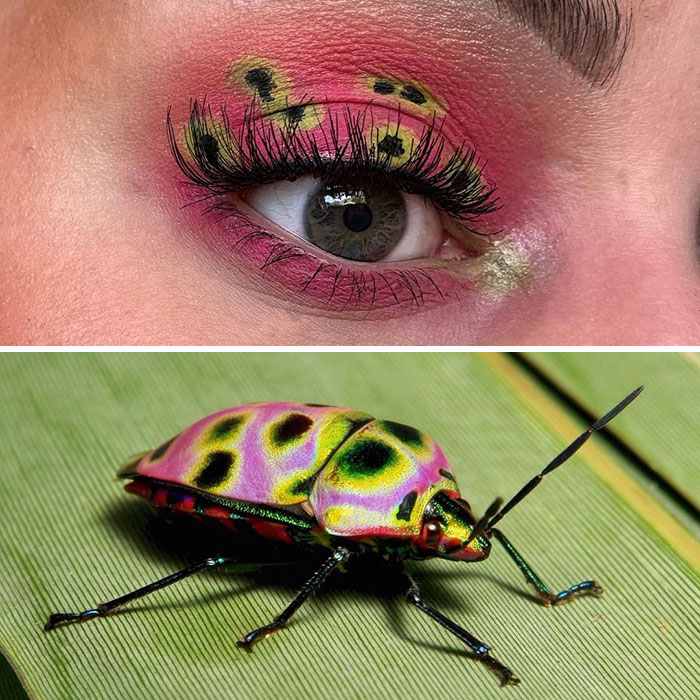
Image credits: Duran Jay / Entomakeup
The talented artist also elaborated on the process of how she goes about doing each makeup design: “Luckily for me, there are millions of insects out there, which means I’m never short of inspiration! I have a list on my phone that I add to whenever I see pictures online, or whenever my friends and followers send me new species they think look interesting.”
“From there I try to pick up on the key colours and textures that I think could translate to makeup, and I visualise an image in my head. Some are quicker to materialise than others—a couple of my looks have taken a matter of minutes to complete and the longest one has taken about 1.5 hours, from looking at a picture to posting the finished look.”
#8
Another rainbow to celebrate on the last day of Pride month, this time inspired by the beautiful little orchid bee (Euglossa hansoni) who gained their name due to their specifically adapted hind legs that allow them to pollinate certain orchids that cannot be pollinated by other insects. These hind legs also help them to collect fragrances (more specifically, chemical compounds called esters) from the orchids so they can use them to show off their genetic quality when attracting a mate!
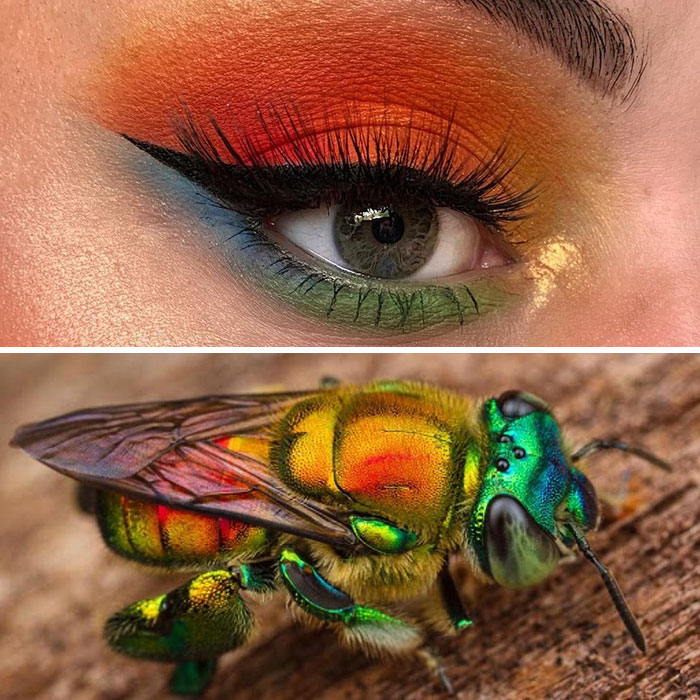
Image credits: Duran Jay / Entomakeup
#9
Pamphobeteus sp. duran.
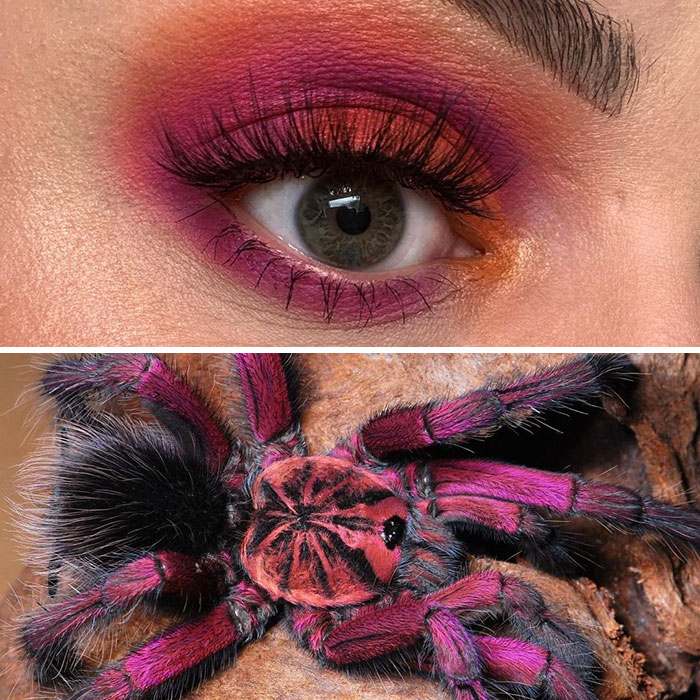
Image credits: Duran Jay / Entomakeup
#10
Orchid mantis (Hymenopus coronatus) feat. my very own Trixie.
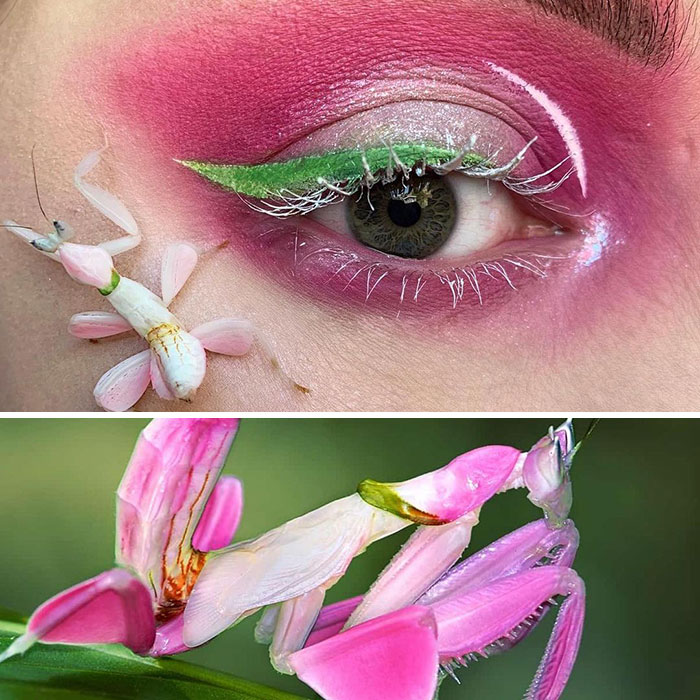
Image credits: Duran Jay / Entomakeup
#11
Uraniid moth (Alcides aurora).
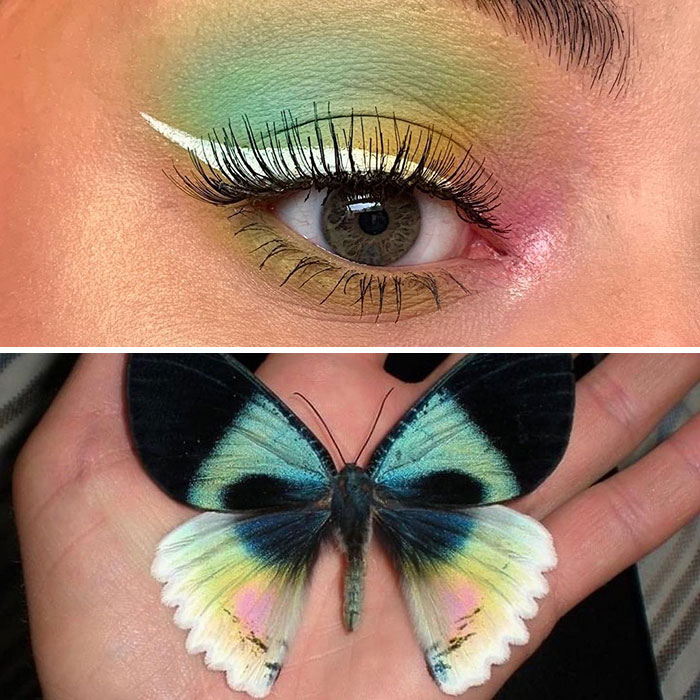
Image credits: Duran Jay / Entomakeup
#12
Giant Peruvian silkmoth (Copaxa medea).
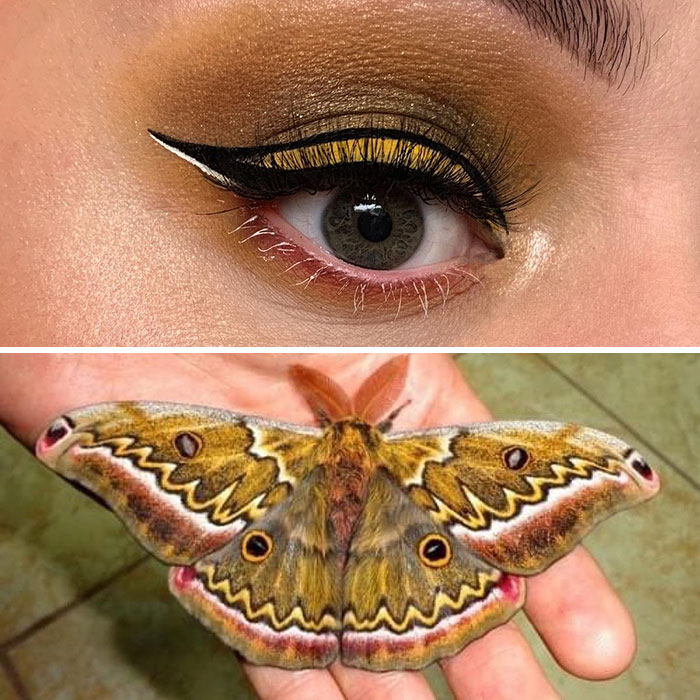
Image credits: Duran Jay / Entomakeup
Like any form of art, this one comes with its own challenges, as Duran explains:
“I only buy cruelty-free brands and work on a tight budget, so I’m pretty limited on my materials and typically only use a handful of products for all of my looks. I’m imaginative, but I’m not a professional makeup artist by any stretch of the imagination, so it can be quite challenging to make the ideas in my mind come to life.”
“It’s also a little daunting sometimes to post on a platform that is dominated by technically skilled and trained [makeup artists] (especially given the subject matter of my posts!). When the page started gaining a bit more traction, I expected to have to deal with hate about my lack of technical skill or about how ‘gross’ insects are, but people have generally been really positive and really supportive. It’s been a truly wonderful experience and I feel really lucky.”
#13
Peruvian grasshopper (Lophacris cristata).
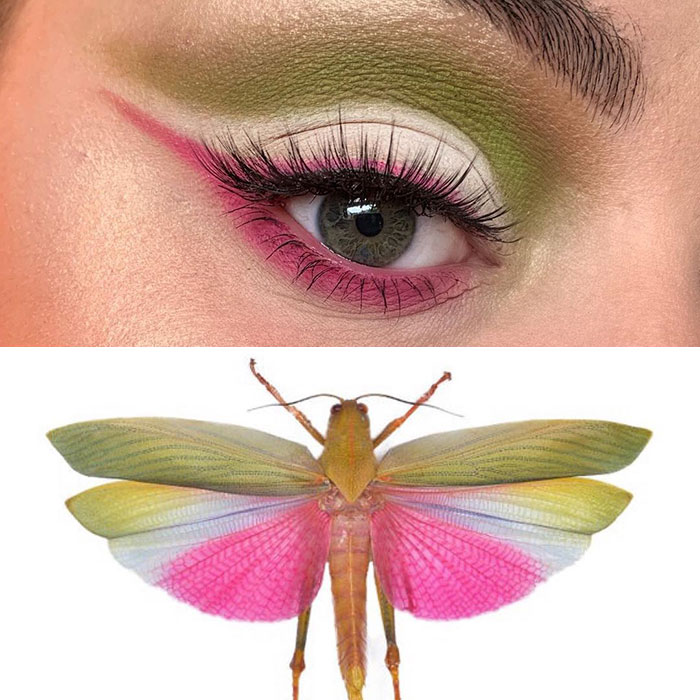
Image credits: Duran Jay / Entomakeup
#14
Finally, the highly-requested and long-awaited Picasso bug (Sphaerocoris annulus).
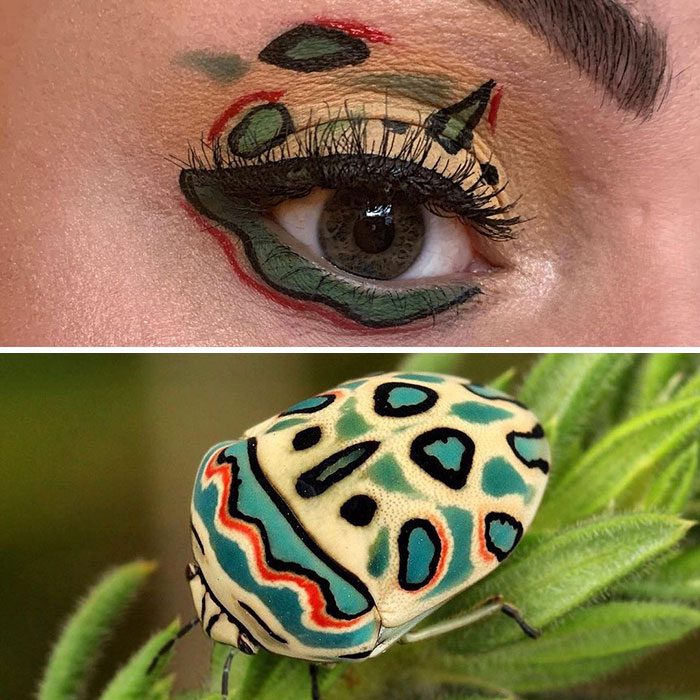
Image credits: Duran Jay / Entomakeup
#15
The imperial tortoise beetle (Stolas imperialis) belongs to the Cassidinae subfamily, which is made up of tortoise and leaf-mining beetles that are quite special because they’re one of the 1% of all insects that typically display maternal instincts and care for their larvae! Werk lil bug mamas.
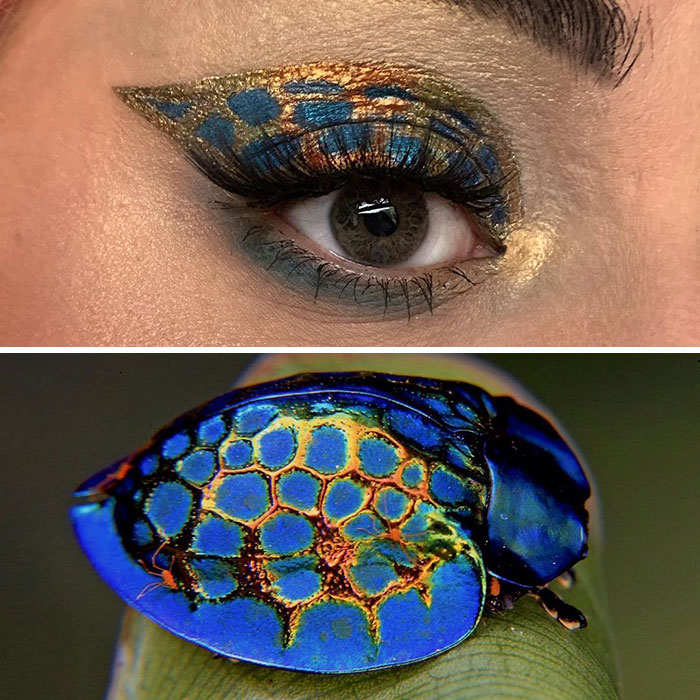
Image credits: Duran Jay / Entomakeup
#16
Flower chafer (Gymnetis pudibunda).
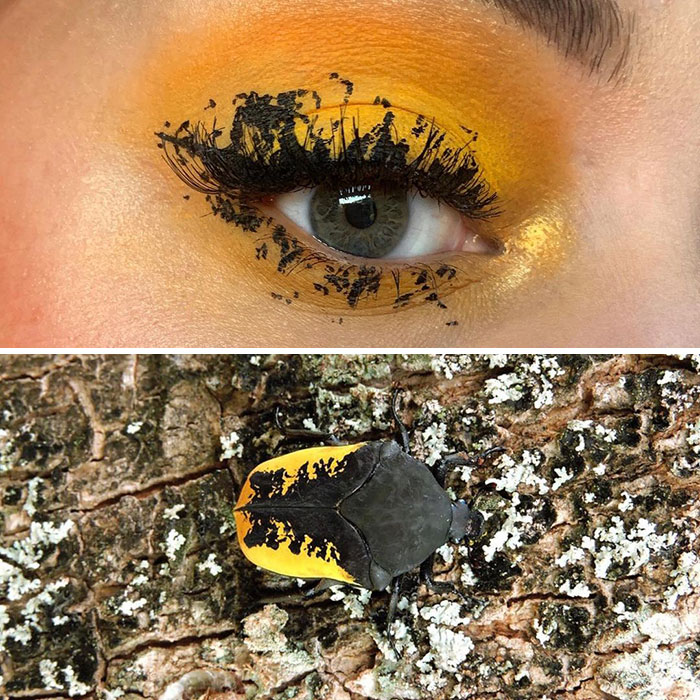
Image credits: Duran Jay / Entomakeup
#17
Goliath beetle (Goliathus goliathus), one of the largest insects on the planet.
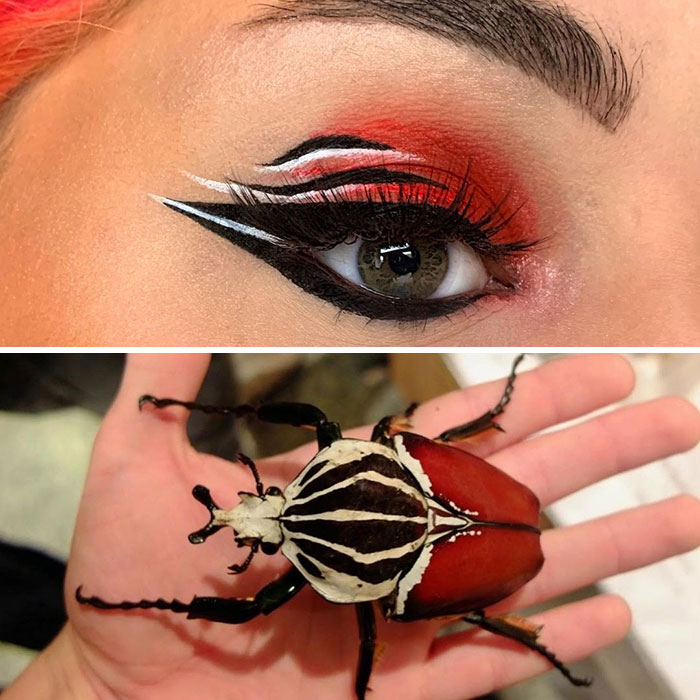
Image credits: Duran Jay / Entomakeup
#18
Crambid moth (Desmia bajulalis).
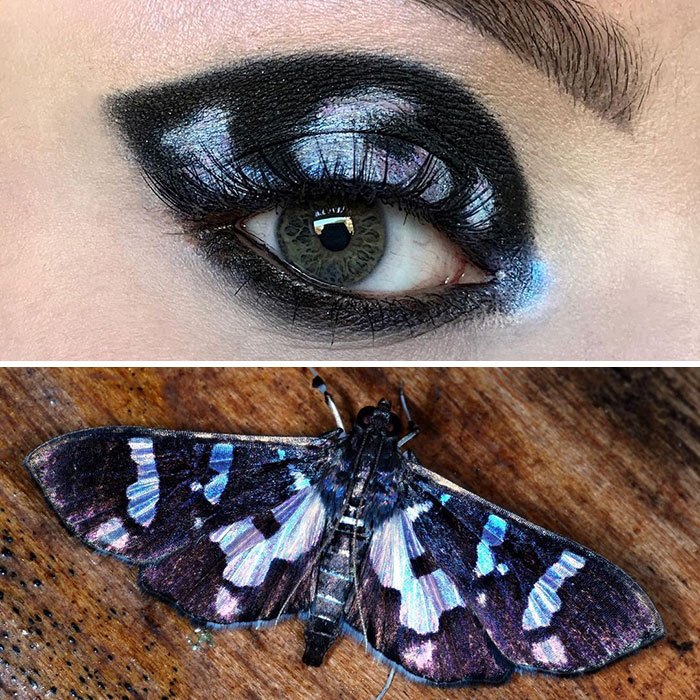
Image credits: Duran Jay / Entomakeup
Now that Duran’s done upwards of 70 unique designs, we’ve asked her about any favorites in the bunch. She had this to say:
“For me, I think my favourites are the tarantula looks, as they’re the ones that tend to get the biggest response. I get a lot of people reaching out to tell me they didn’t realise spiders could be so pretty and that I’ve helped them start to move past their fear, which is really what the page is all about!”
“I also have a huge soft spot for moths, and my look based on the beautiful pink and yellow roseate emperor is something I’d happily wear on a day-to-day basis. The ones that push me to try colour combinations I wouldn’t usually go for (like orange and purple, or pink and green) are really fun too.”
#19
Probably my favourite butterfly I’ve been fortunate enough to see in the wild, a blue morpho (Morpho helenor).
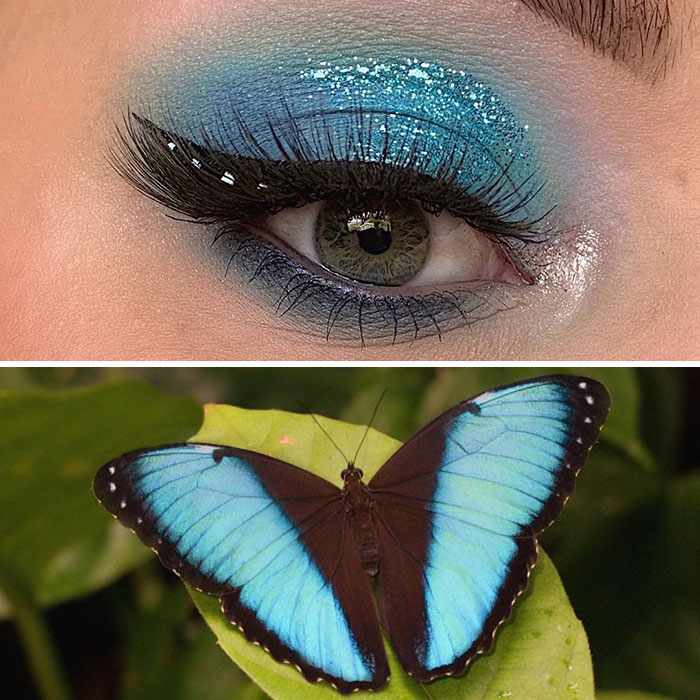
Image credits: Duran Jay / Entomakeup
#20
Thrilled that my first post of 2021 is this beautiful Spanish moth (Xanthopastis timais), whose larval form is known as the ‘convict caterpillar’ due to their distinctive black and white stripes. Always a fan of any orange and pink combo (those who’ve seen my hair already know this) and that little love heart marking? Too precious, I couldn’t resist ?
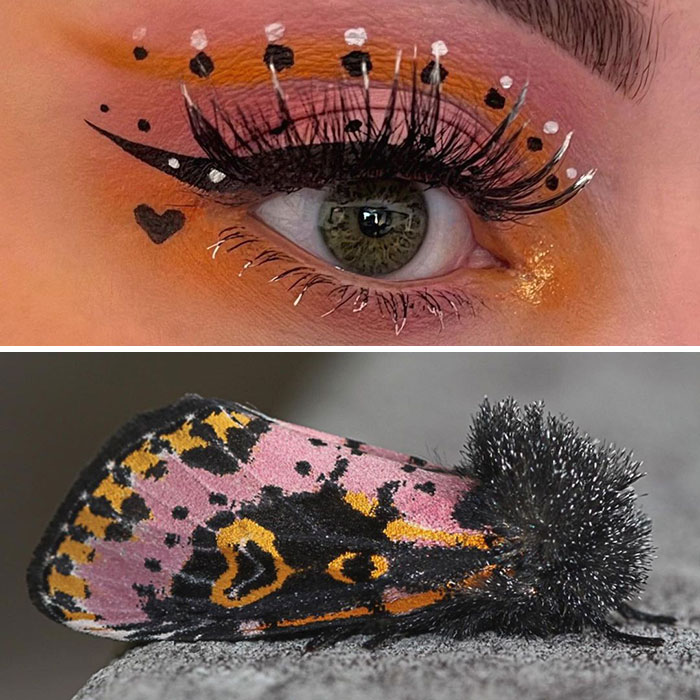
Image credits: Duran Jay / Entomakeup
#21
Notodontid moth caterpillar (Lobeza medina).
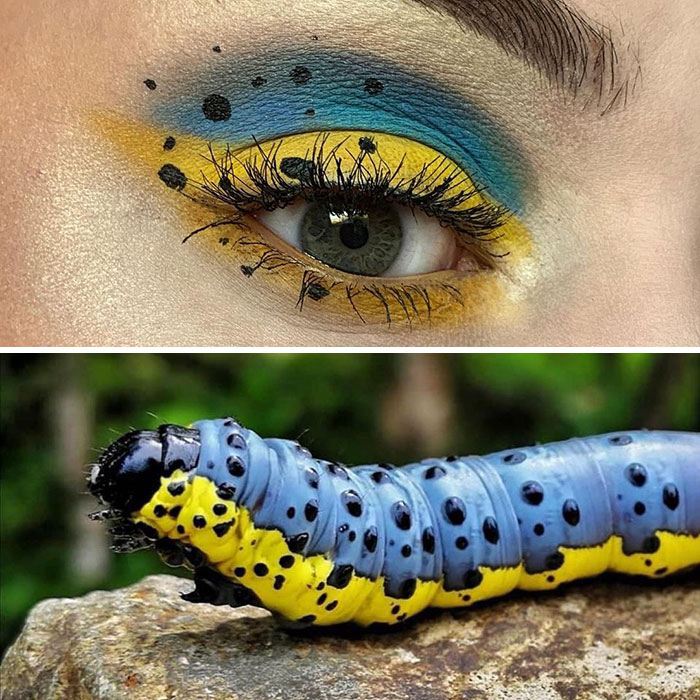
Image credits: Duran Jay / Entomakeup
#22
Since Pride month is upon us, it only seems right to create at least one rainbow look! Though this perhaps isn’t the typical spectrum we’re used to seeing, at only 5mm this little jumping spider (Maratus robinsoni) is known to researchers as ‘nature’s smallest rainbow’. In fact, it is the only known example of a spider that deploys all colours of the rainbow to attract a mate, all from those tiny iridescent scales on his lil bug butt.
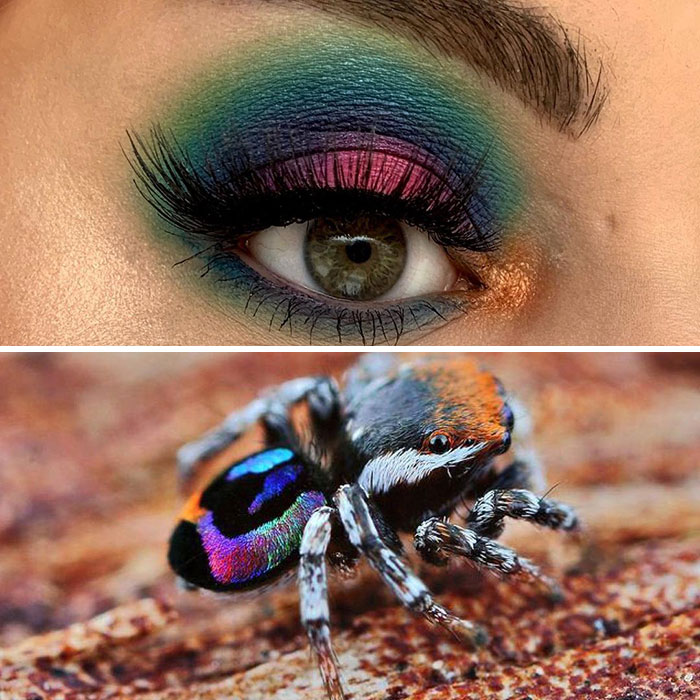
Image credits: Duran Jay / Entomakeup
#23
The Antilles pink toe (Caribena versicolor, formerly Avicularia versicolor) has to be one of my favourite tarantulas. Although they’re readily available and pretty commonly kept as pets due to their docile nature (and pretty colours ofc), I still consider it a ‘dream T’ and hope to own one some day soon (when I find the space!).
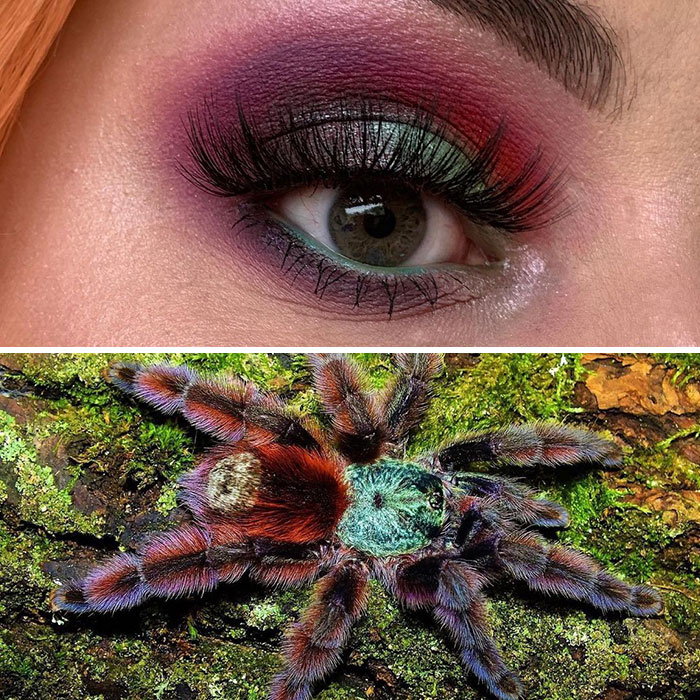
Image credits: Duran Jay / Entomakeup
#24
Mirror spiders (Thwaitesia argentiopunctata) use reflective guanine to display their unique colouration, which is actually the same thing found in our shampoo that gives it that pearly iridescent sheen.
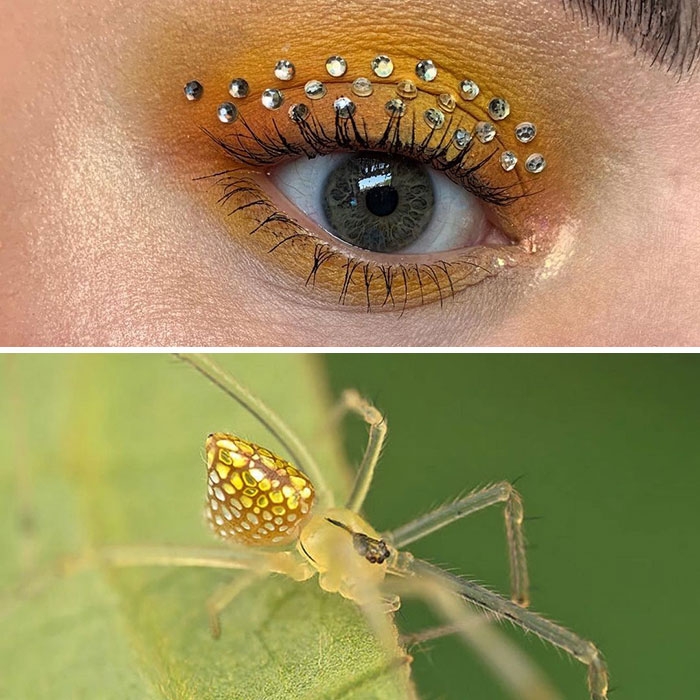
Image credits: Duran Jay / Entomakeup
#25
The saddleback caterpillar (Acharia stimulea) gains its name from its unique aposematic colouring, used primarily to alert potential predators that they are toxic (and basically wouldn’t make a very nice dinner).
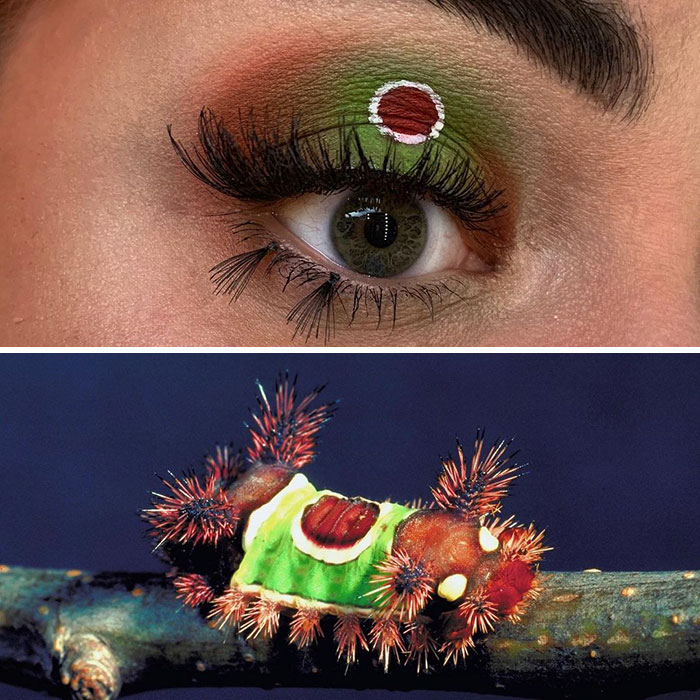
Image credits: Duran Jay / Entomakeup
There is also some exciting news to be had as Duran told Bored Panda that she’ll soon be taking part in her very first physical exhibition. While she can’t disclose any details just yet as they aren’t finalized yet, you are more than welcome to follow her Instagram to find out more about it.
But before you go, tell us some of your favorite bugs, or perhaps you have suggestions for Duran on what insects she could cover next? Do this in the comment section below!
#26
If you know, you know... ? giraffe weevil (Trachelophorus giraffa).
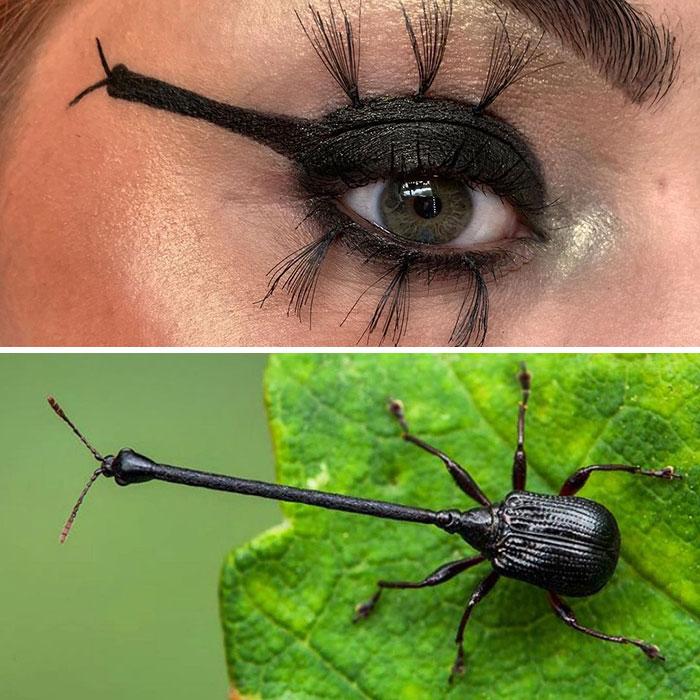
Image credits: Duran Jay / Entomakeup
#27
Roseate skimmer (Orthemis ferruginea), my first entry from order Odonata. So many bug families and orders still unexplored on this page, which is terribly exciting really! The inspiration feels endless.
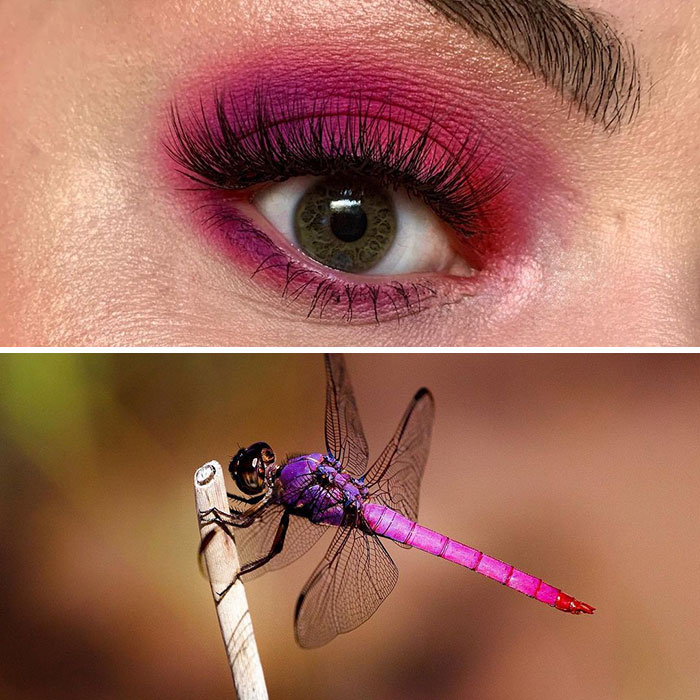
Image credits: Duran Jay / Entomakeup
#28
Eastern tiger swallowtail (Papilio glaucus). Not a fan of this one at all but ya girl tried.
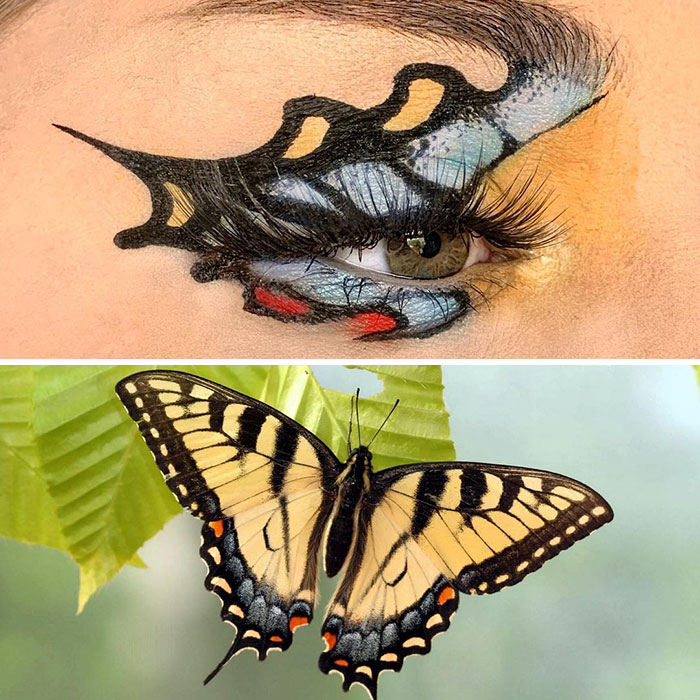
Image credits: Duran Jay / Entomakeup
#29
Amazon blue bloom tarantula (Xenesthis intermedia).
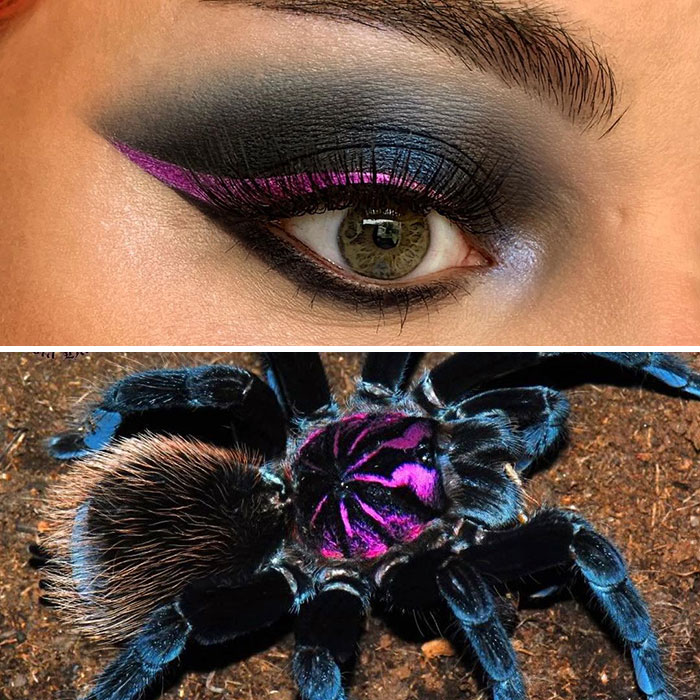
Image credits: Duran Jay / Entomakeup
#30
Hypselodoris bennetti.
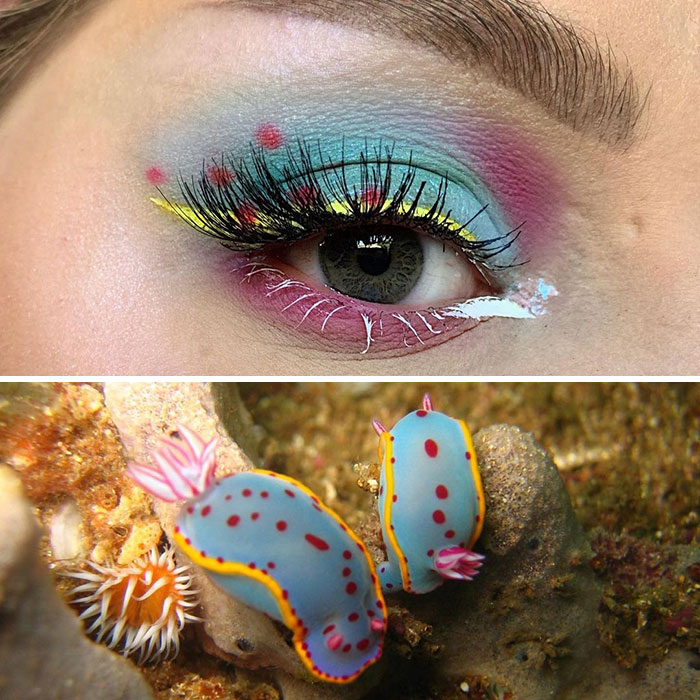
Image credits: Duran Jay / Entomakeup
#31
Indian lily moth (Polytela gloriosae).
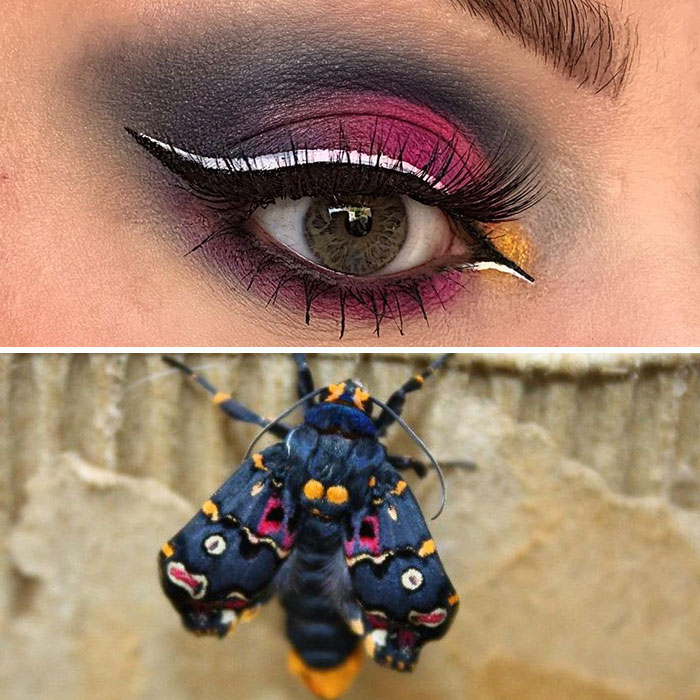
Image credits: Duran Jay / Entomakeup
#32
Bit of a manic day today so had to do this one on-the-go (literally sat in my car)! This strange little beast (Cladonota apicalis) belongs to the treehopper family Membracidae, which are found in all continents across the world except Antarctica.
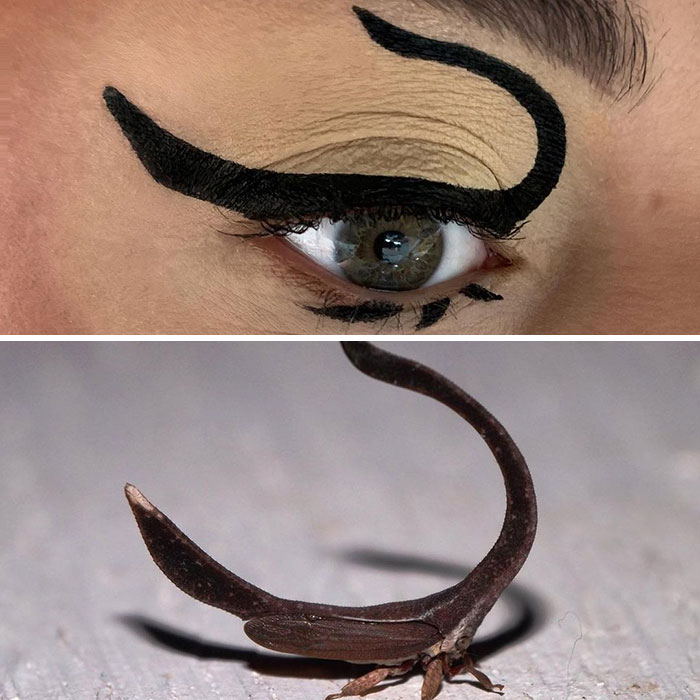
Image credits: Duran Jay / Entomakeup
#33
This leggy boii is a polychromatic earth tiger (Haploclastus devamantha), a relatively small burrowing tarantula from India!
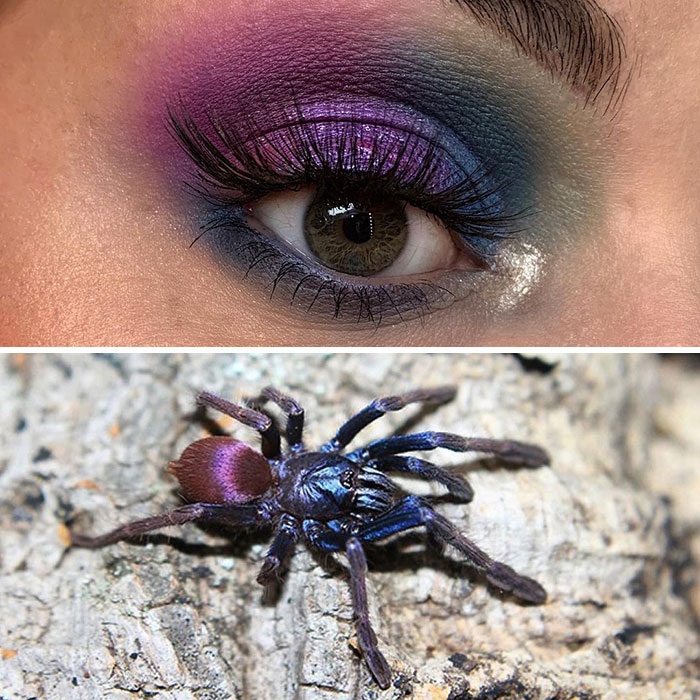
Image credits: Duran Jay / Entomakeup
#34
Happy World Bee Day! There are at least 5700 species of bee in the Apidae family, and the Indian black carpenter bee (Xylocopa tenuiscapa) is a perfect little reminder that they’re not all the classic black and yellow fuzzy friends we’re so used to seeing.
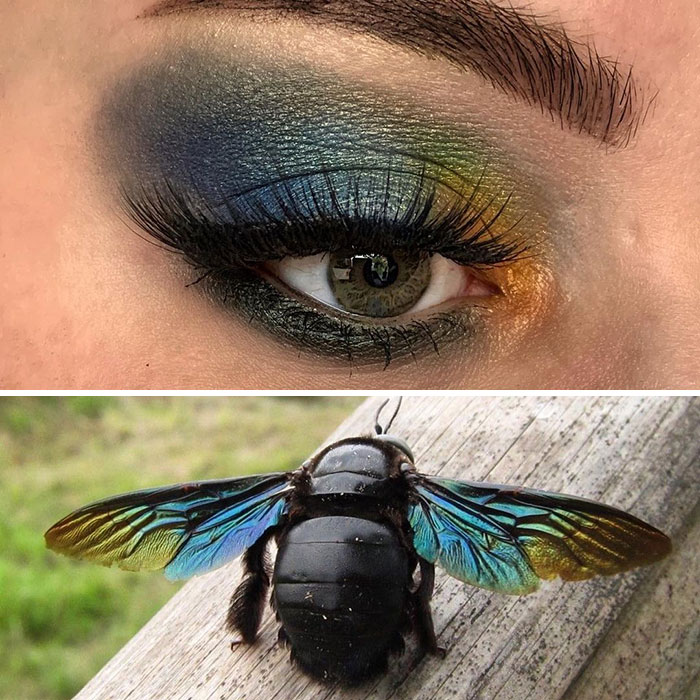
Image credits: Duran Jay / Entomakeup
#35
Hibiscus harlequin nymph (Tectocoris diophthalmus).
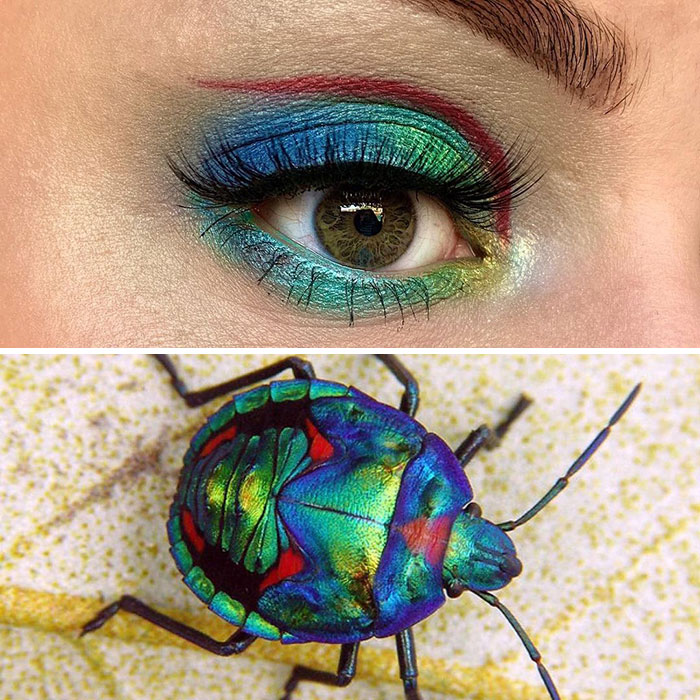
Image credits: Duran Jay / Entomakeup
#36
Coastal peacock spider (Maratus speciosus).
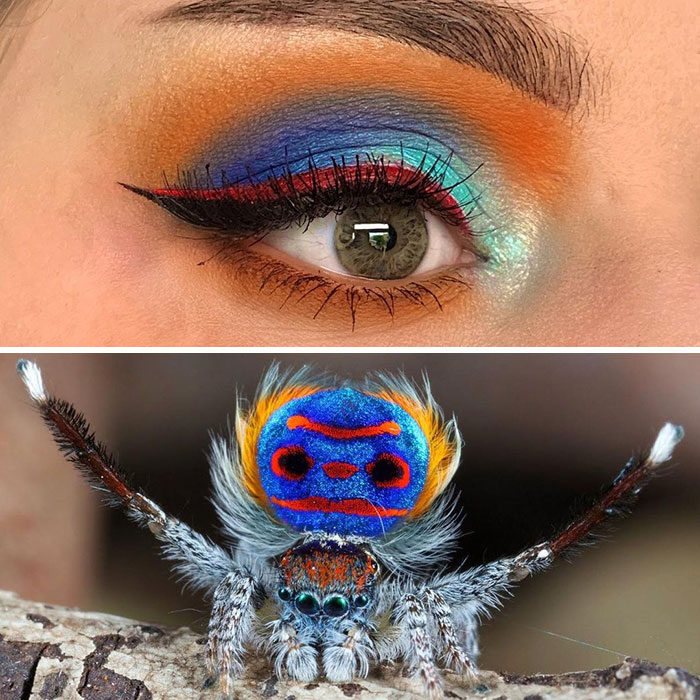
Image credits: Duran Jay / Entomakeup
#37
Ladybird spider (Eresus sandaliatus).
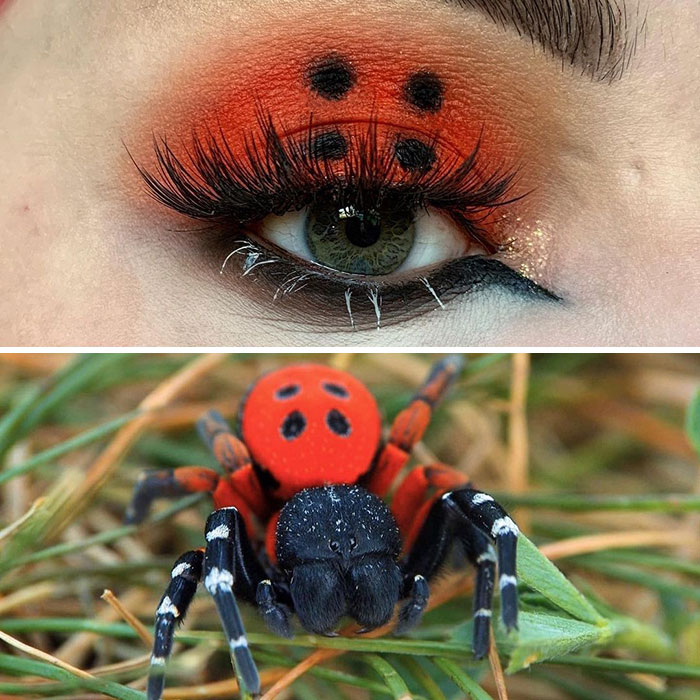
Image credits: Duran Jay / Entomakeup
#38
Surprised it’s taken me this long to recreate a phasmid! Madagascan stick insect (Achrioptera fallax).
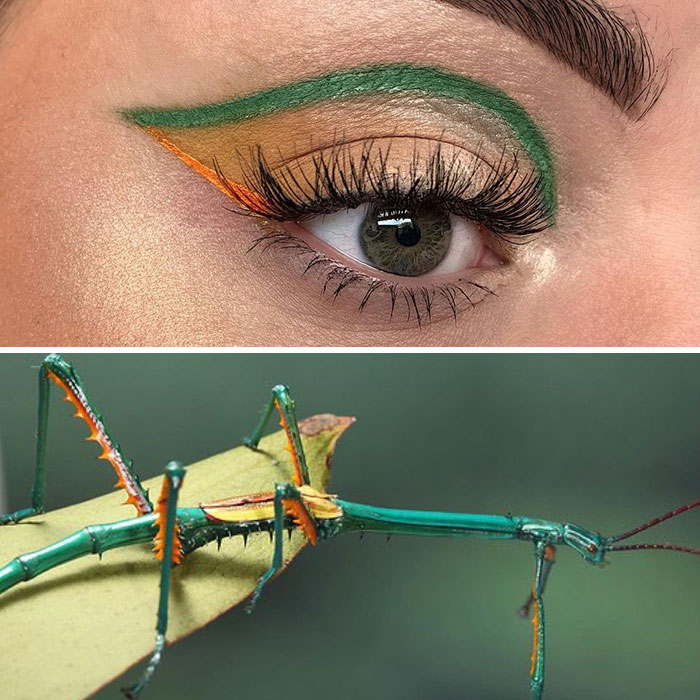
Image credits: Duran Jay / Entomakeup
#39
Niepelt’s eyed silkmoth caterpillar (Automeris niepelti) - despite how cute these may look, that colourful ‘fluff’ is actually made up of urticating spines that are quite venomous!
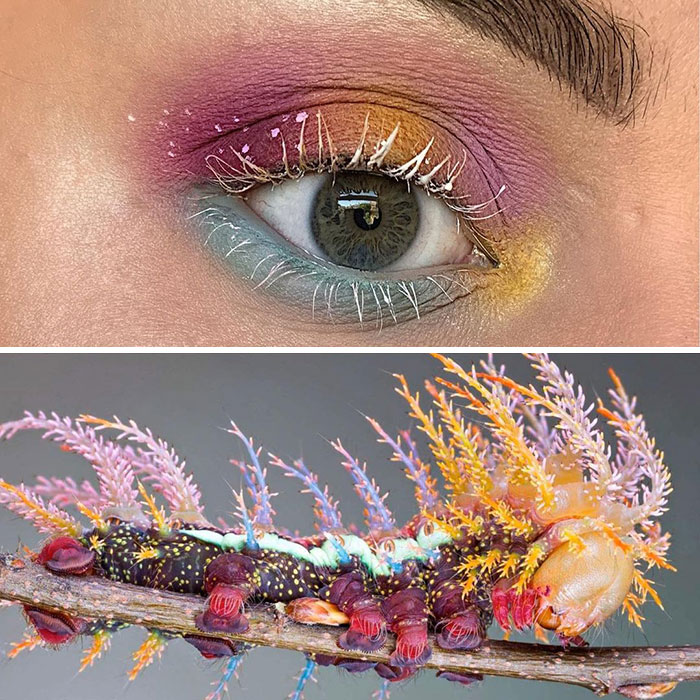
Image credits: Duran Jay / Entomakeup
#40
Shield-backed jewel bug (Poecilocoris druraei).
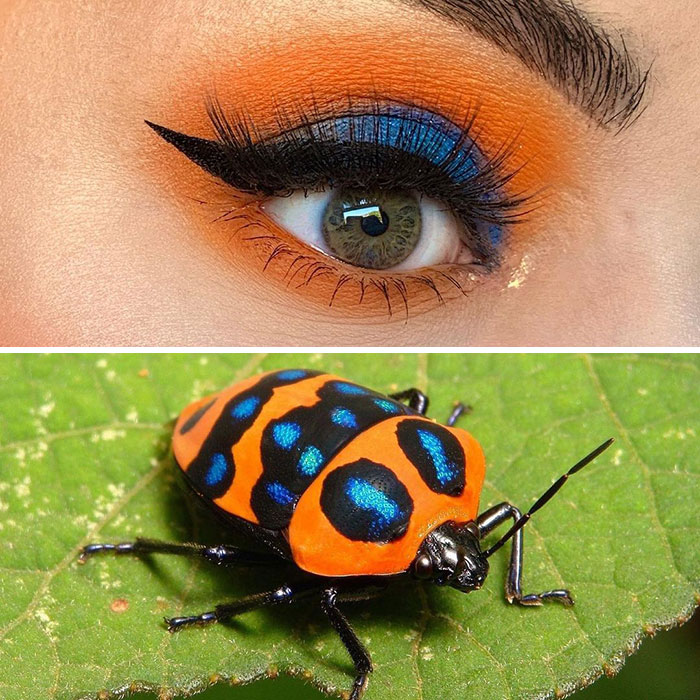
Image credits: Duran Jay / Entomakeup
#41
Here’s one I’ve been meaning to do for a really, really long time. The Brazilian jewel (Typhochlaena seladonia), arguably one of the most beautiful arthropods out there.
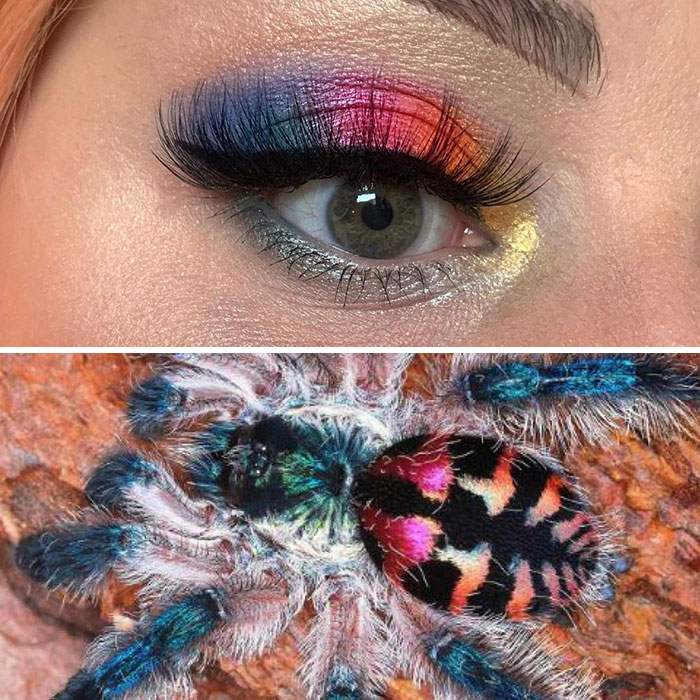
Image credits: Duran Jay / Entomakeup
#42
Lipstick skipper (Haemactis sanguinalis).
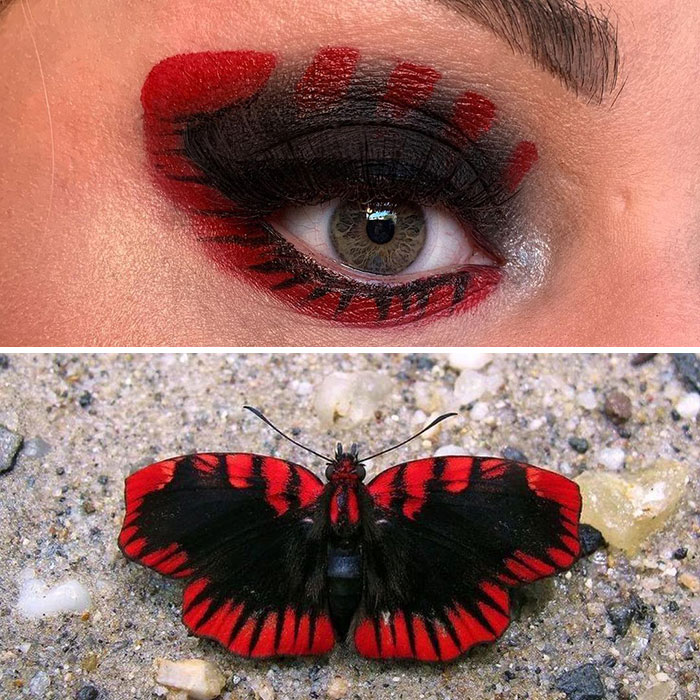
Image credits: Duran Jay / Entomakeup
#43
For today I decided to go with @coxjamee’s suggestion of a huntsman spider (Heteropoda lunula) because I couldn’t resist those beautiful blue and purple tones.
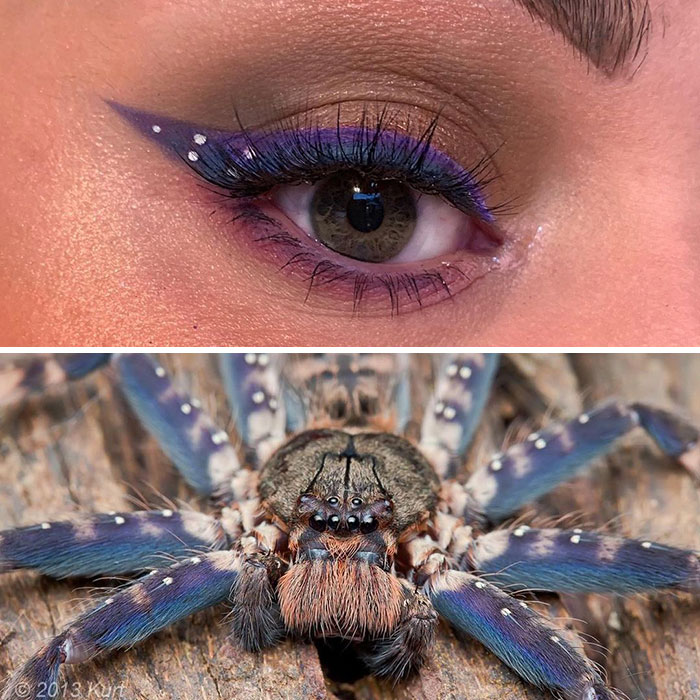
Image credits: Duran Jay / Entomakeup
#44
Listed on the IUCN Red List as Critically Endangered, the gooty sapphire ornamental (Poecilotheria metallica) is one of the most beautiful tarantulas you can find and considered a bit of a staple display species amongst spider hobbyists. Do you have one?
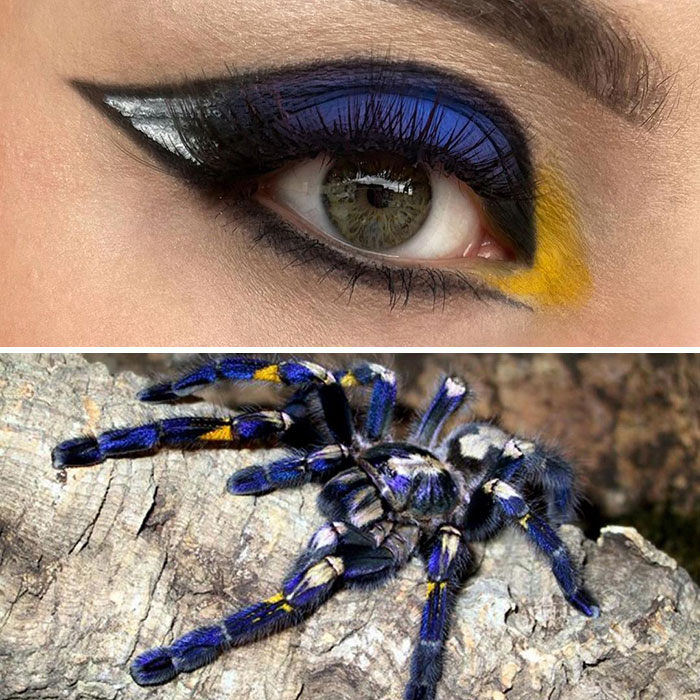
Image credits: Duran Jay / Entomakeup
#45
Giant Amazon dung beetle (Coprophanaeus lancifer)
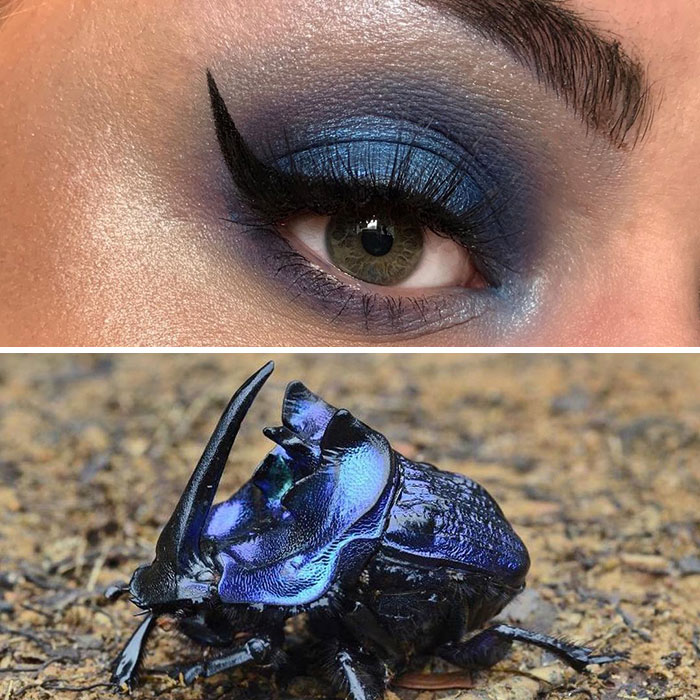
Image credits: Duran Jay / Entomakeup
#46
Bhutan glory (Bhutanitis lidderdalii).
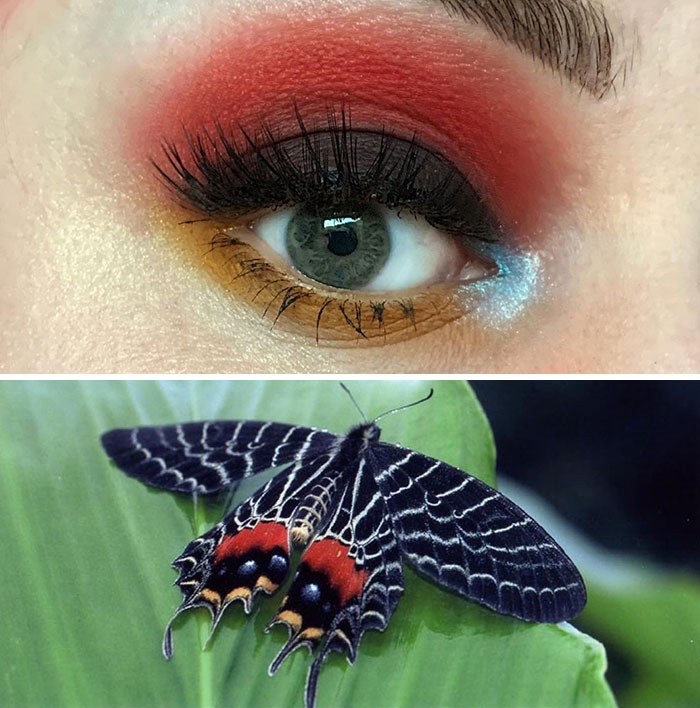
Image credits: Duran Jay / Entomakeup
#47
Madagascan sunset moth (Chrysiridia rhipheus).
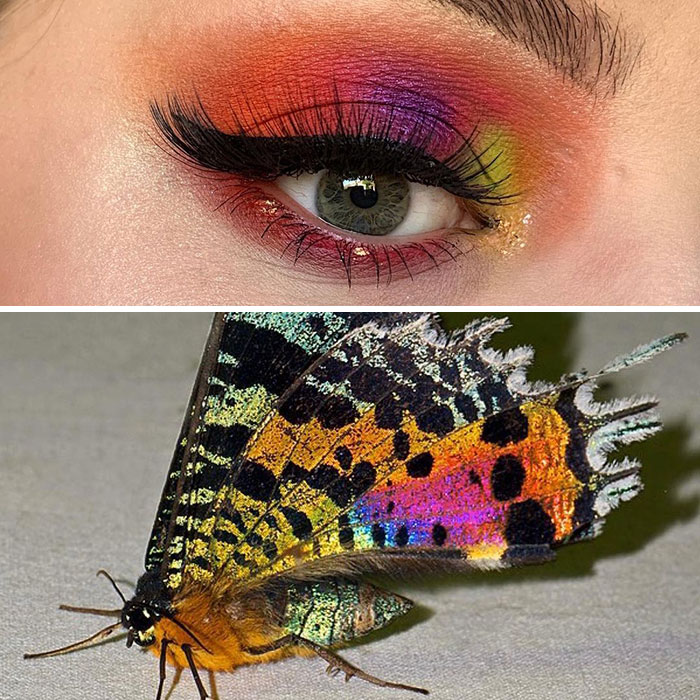
Image credits: Duran Jay / Entomakeup
#48
New hair calls for co-ordinating makeup... cuckoo wasp (Chrysura laevigata).
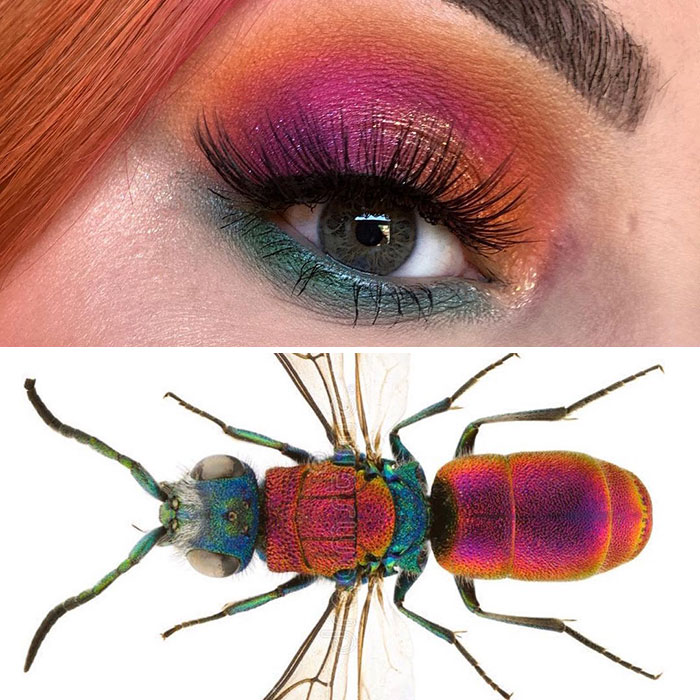
Image credits: Duran Jay / Entomakeup
#49
Pink chromodoris (Chromodoris bullocki).
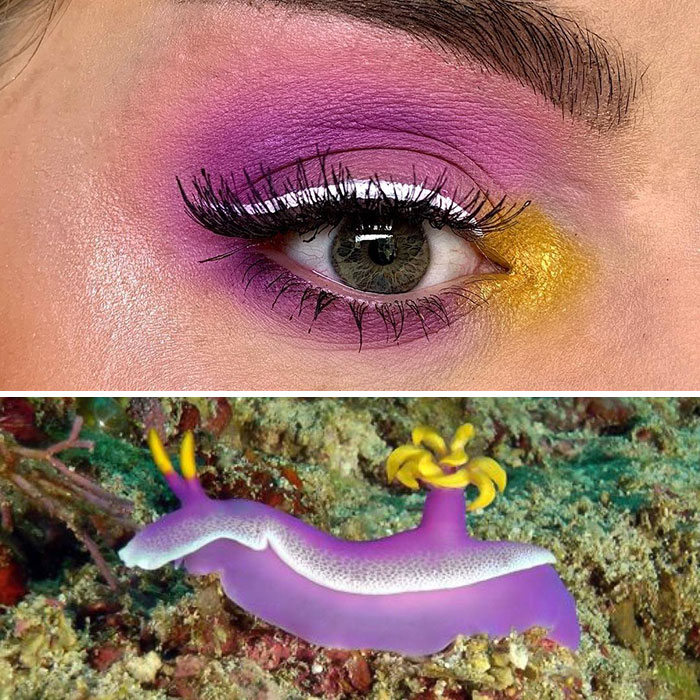
Image credits: Duran Jay / Entomakeup
#50
Giant rainforest mantis (Hierodula majuscula).
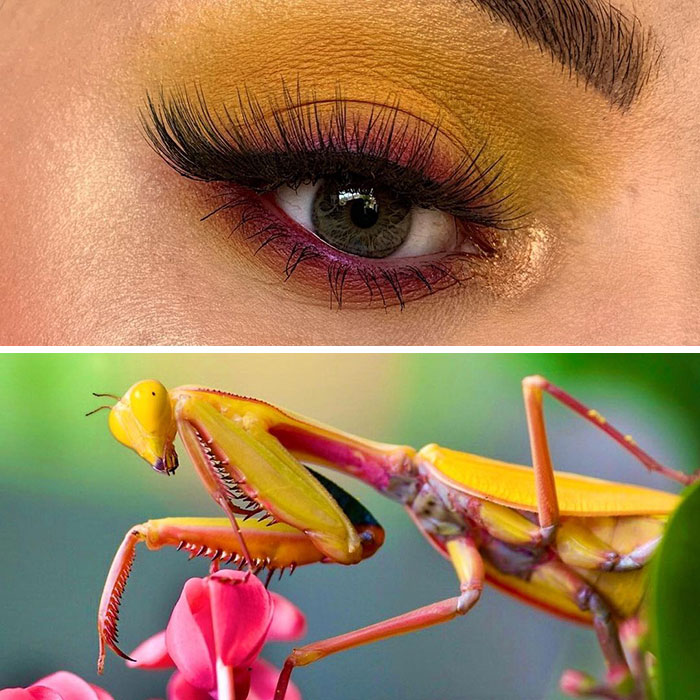
Image credits: Duran Jay / Entomakeup
#51
Jewel beetle (Chrysochroa fulgidissima).
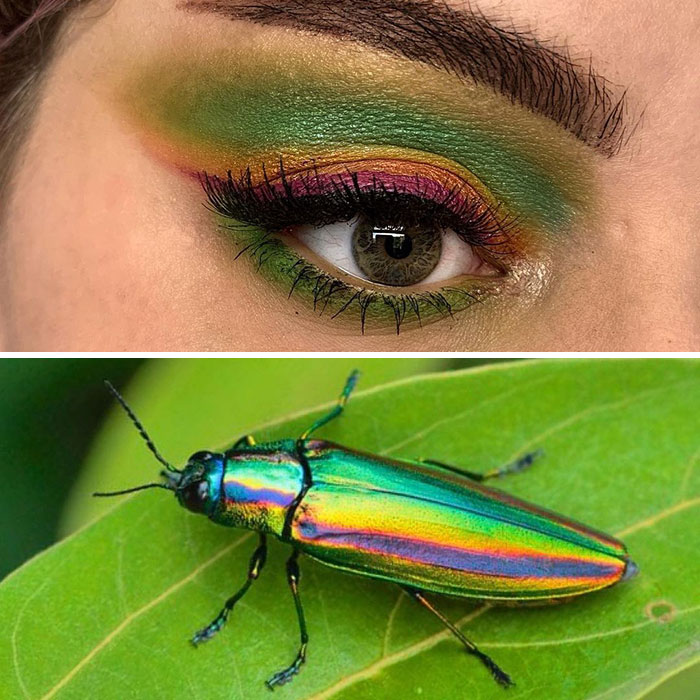
Image credits: Duran Jay / Entomakeup
#52
Bolivian dwarf beauty (Cyriocosmus perezmilesi) - proof that a bug doesn’t have to be super bright and colourful to be a lil cutie.
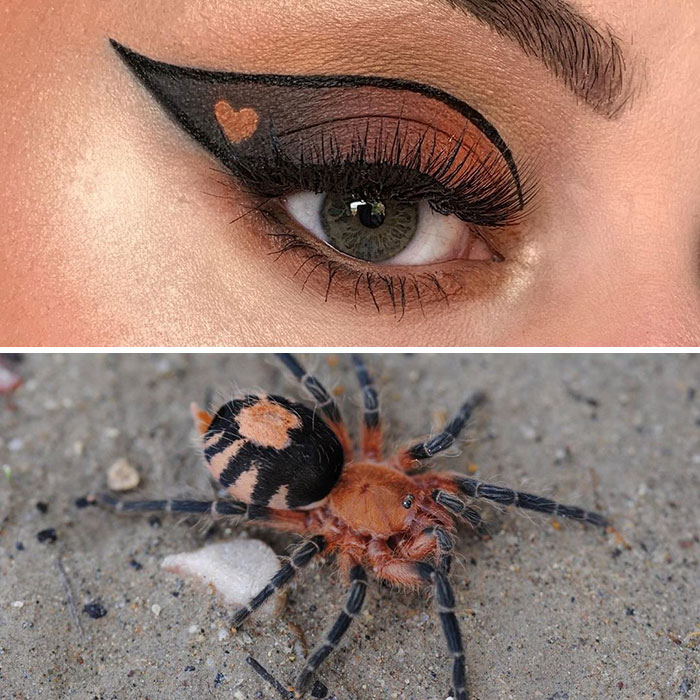
Image credits: Duran Jay / Entomakeup
#53
Rosy maple moth (Dryocampa rubicunda).
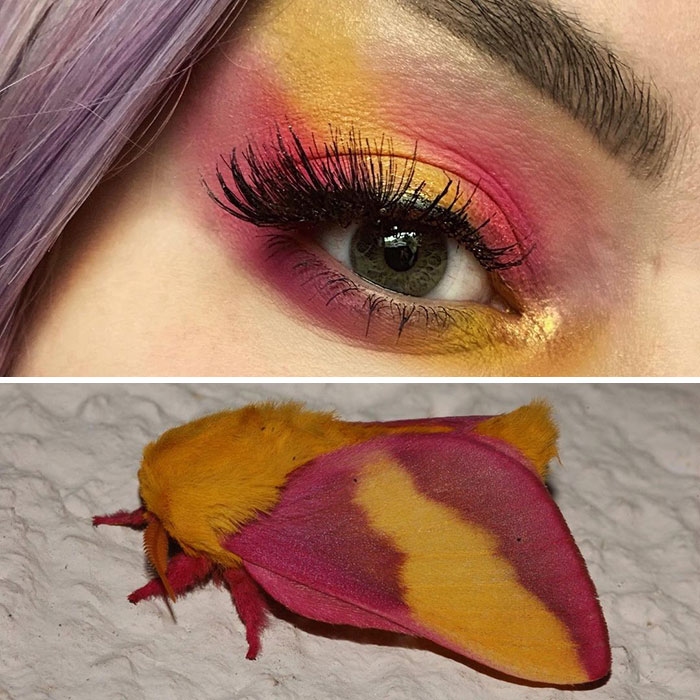
Image credits: Duran Jay / Entomakeup
#54
Known for being aggressive, having insanely painful stings and generally just being utter b*stards, meet the bull ant (Myrmecia brevinoda).
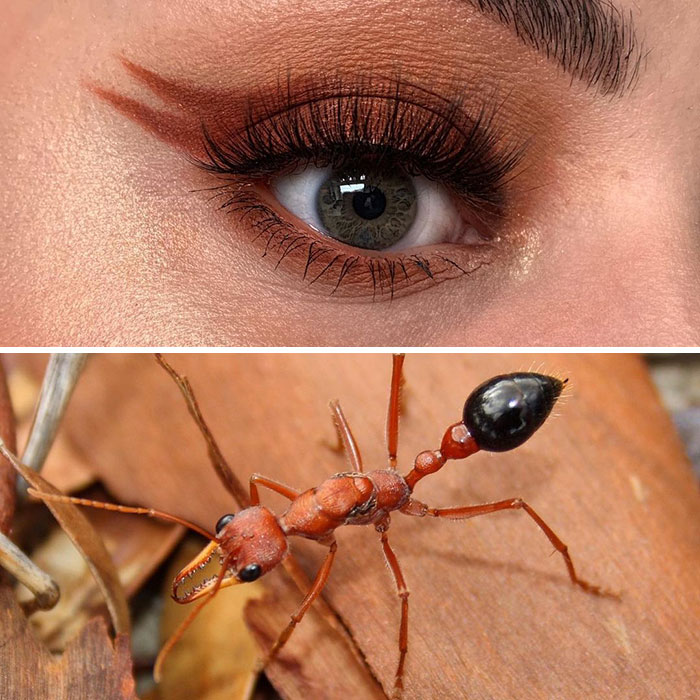
Image credits: Duran Jay / Entomakeup
#55
Another miss... ironic, given its name ? golden target tortoise beetle (Ischnocodia annulus).
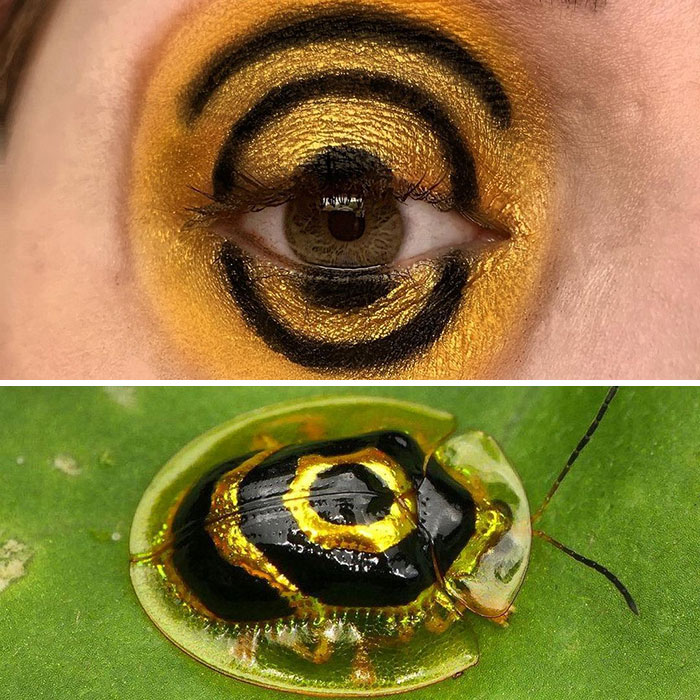
Image credits: Duran Jay / Entomakeup
#56
It’s kinda funny to me that some of my favourite makeup looks so far have been those that I did on days I felt tired, sad and/or uninspired and just wanted to get something quick or basic on my face so I could go run errands. This precious and colourful little beast is an elephant hawk moth (Deilephila elpenor), one of my personal favourite leps and a native to the UK, though I’m yet to see one myself! It’s actually quite a significant species in the animal kingdom as it was one of the first in which nocturnal colour vision was documented, which is thought to be particularly well-developed since it uses up so much of its energy hovering to collect nectar at night.
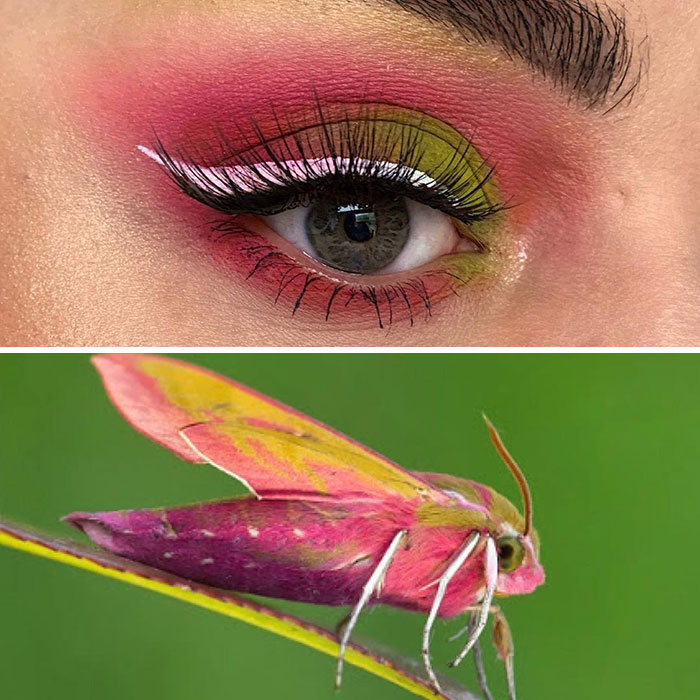
Image credits: Duran Jay / Entomakeup
#57
Blue glaucus (Glaucus atlanticus) - fascinating little creatures that actually float upside down using the surface tension of the water to stay up.
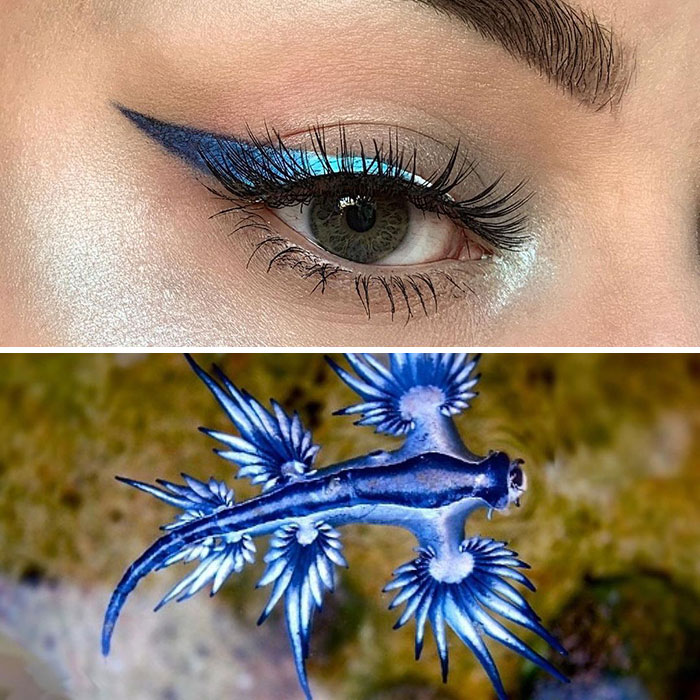
Image credits: Duran Jay / Entomakeup
#58
Today’s makeup is a bit of a tribute to my giant African mantis (Sphodromantis viridis), who was the first ever invert I brought home with me and is probably my favourite mantis I’ve ever kept. Today when I woke up and checked on him I knew he didn’t have long left. He lived to be a bit of an old man so I’m trying not to feel sad but anybody who knows me personally will know how much that little monster means to me.
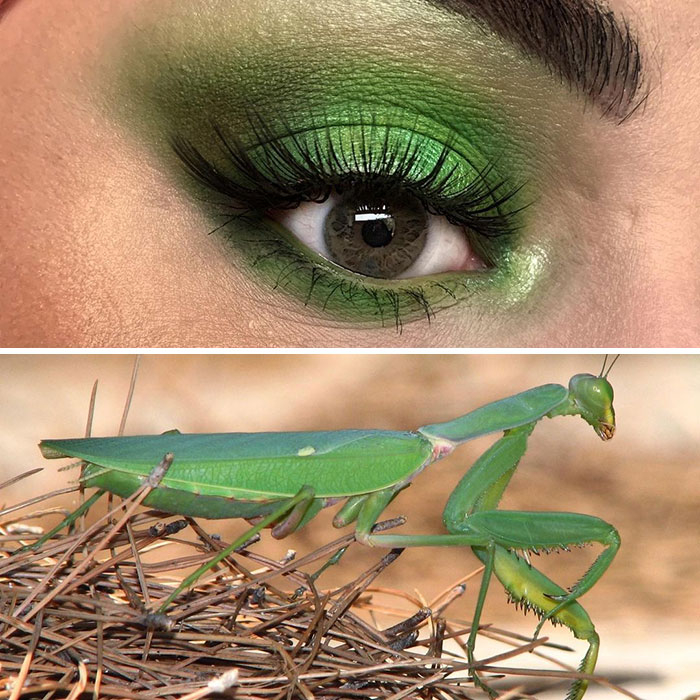
Image credits: Duran Jay / Entomakeup
#59
One of my favourite mantids and one I hope to add to my collection soon, the spiny flower mantis (Pseudocreobotra wahlbergii).
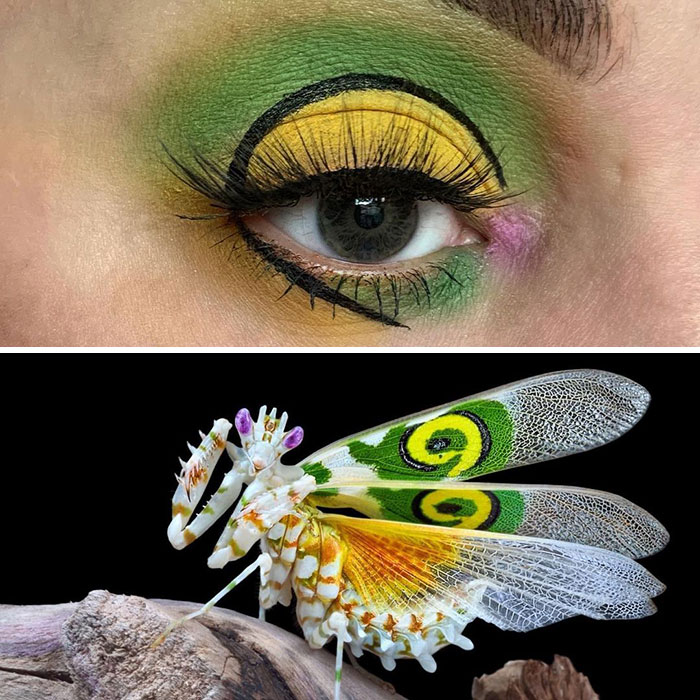
Image credits: Duran Jay / Entomakeup
#60
Decided to go for a species that is a little less remarkable and often overlooked - the silverfish (Lepisma saccharina), an apterous (wingless) insect often found in many homes across the world.
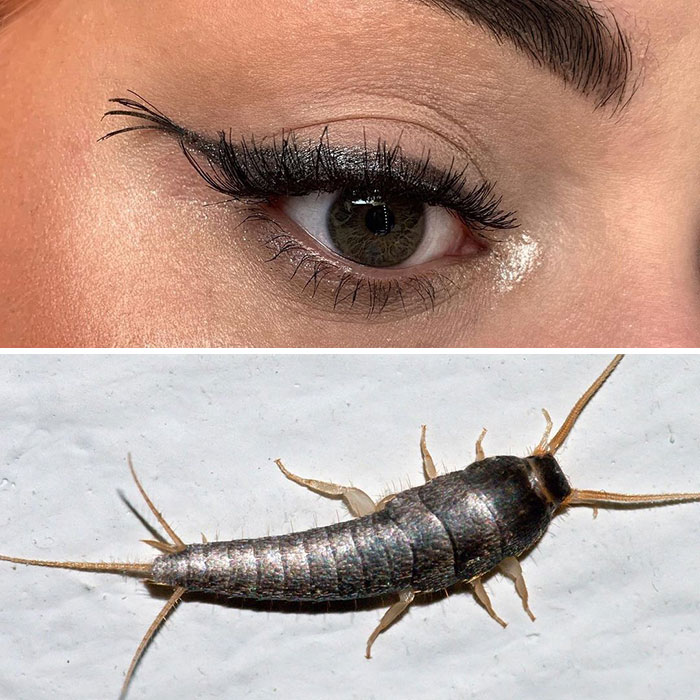
Image credits: Duran Jay / Entomakeup
#61
Peacock silkmoth (Automeris amanda) - this cutie belongs to the Saturniidae family, which contains some of the largest and arguably most beautiful moths in the world. There are an estimated 2,300 species of Saturniid, with 124 of those belonging to the Automeris genus alone!
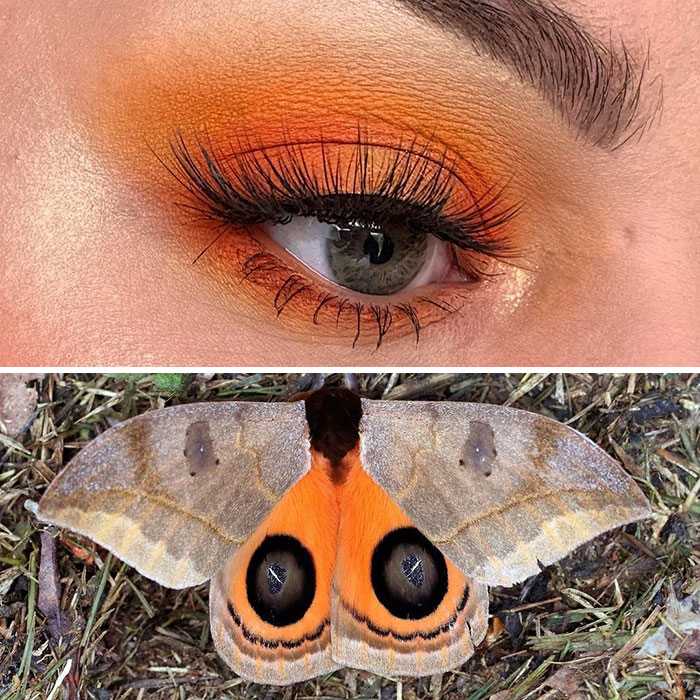
Image credits: Duran Jay / Entomakeup
#62
Suraka silk moth (Antherina suraka).
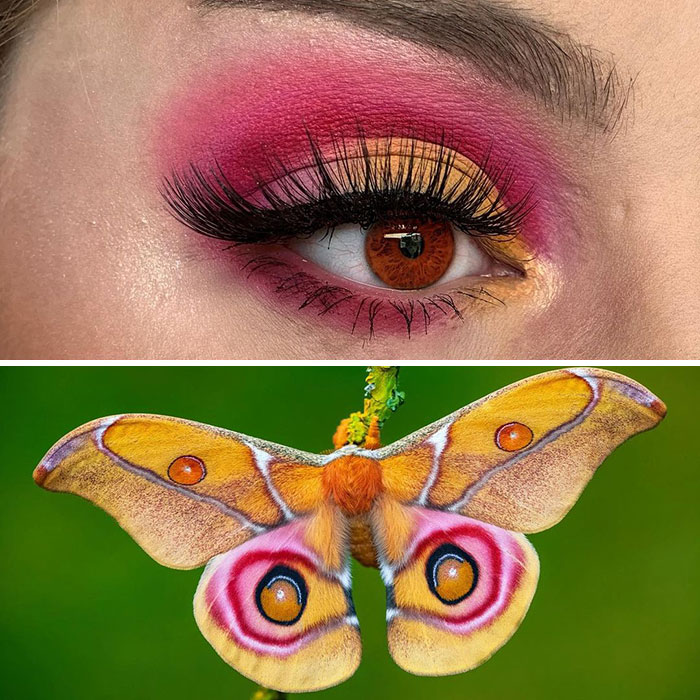
Image credits: Duran Jay / Entomakeup
#63
I asked what people wanted to see in my IG story and was pretty surprised so many of you picked to see a spider look! So here it is, Birupes simoroxigorum, one of my favourite colour combos yet I think.
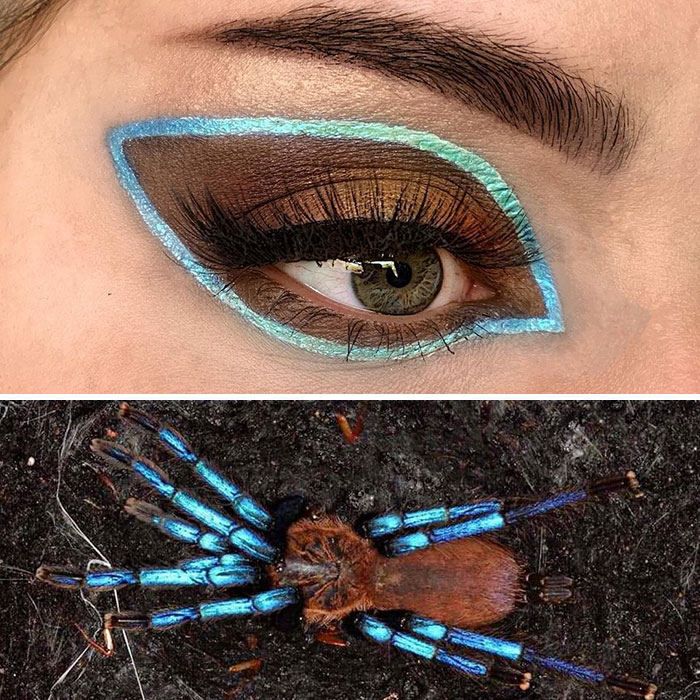
Image credits: Duran Jay / Entomakeup
#64
Had an overwhelming amount of support from the @entomemeology community today so I just want to say hello (and thank you!) to my new followers! Today’s is just a super quick one as I’ve spent most my day researching all the amazing suggestions I’ve been given, this being one of them: the jewel scarab beetle (Chrysina spectabilis).
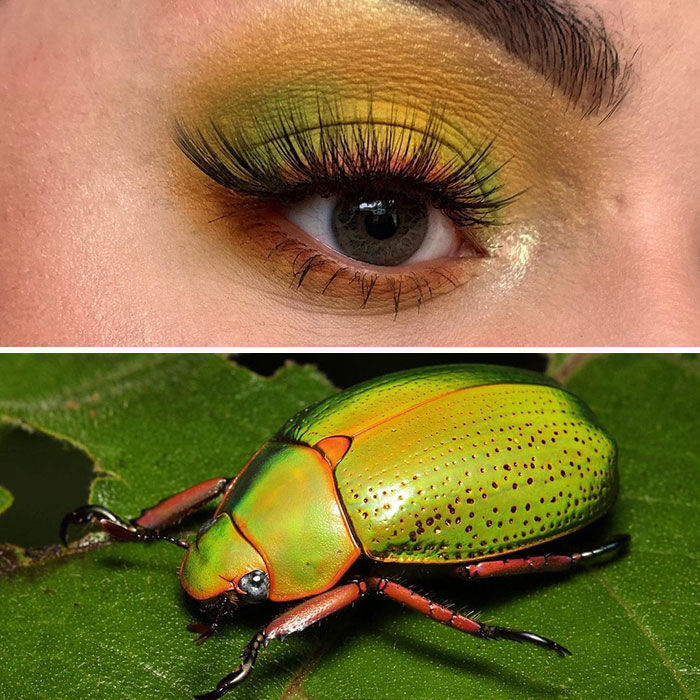
Image credits: Duran Jay / Entomakeup
#65
The blushing phantom (Cithaerias pireta) belongs to the largest family of butterflies, Nymphalidae, which boasts an estimated 6,000 known species. Amazingly, brush-footed butterflies still only account for around 3.75% of all Lepidopterans!
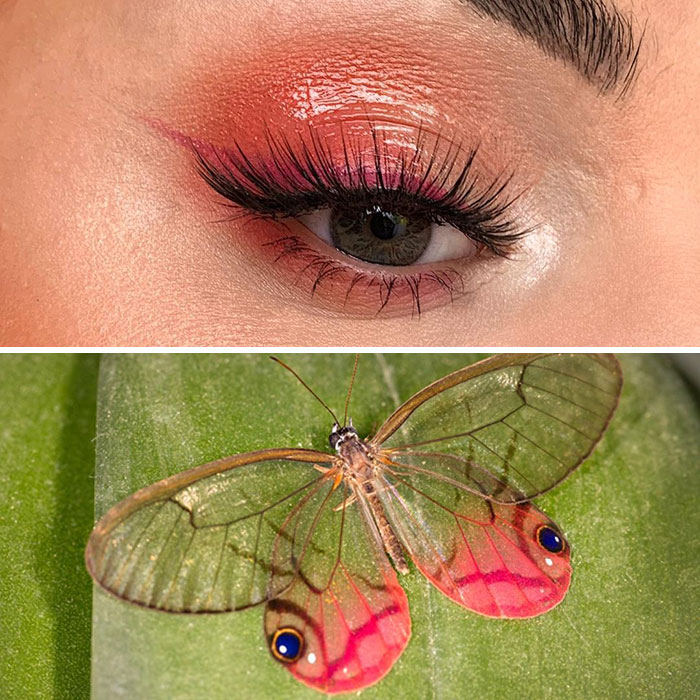
Image credits: Duran Jay / Entomakeup
#66
Okay okay so I know this isn’t a bug, but other arthropods still count right?! It only seems right to pay homage to the Halloween crab (Gecarcinus quadratus) on today, the spookiest of all days ?
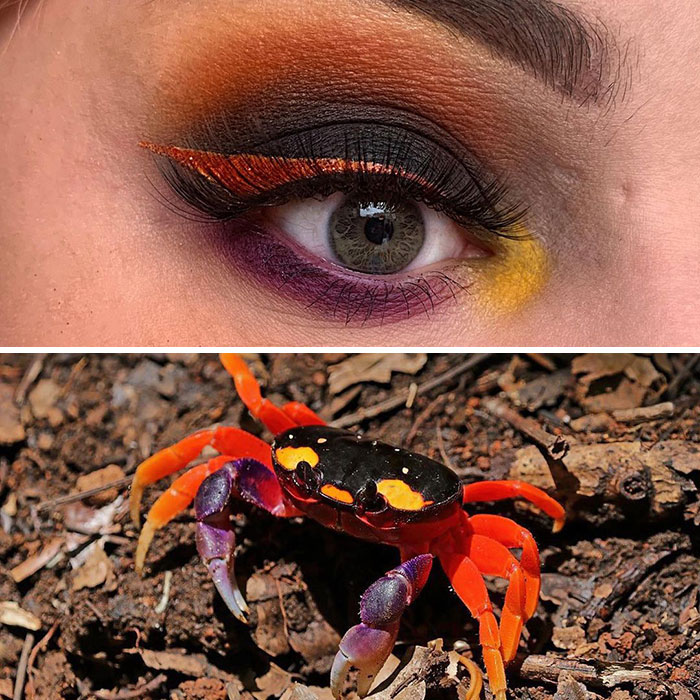
Image credits: Duran Jay / Entomakeup
#67
Spanish dancer (Hexabranchus sanguineus).
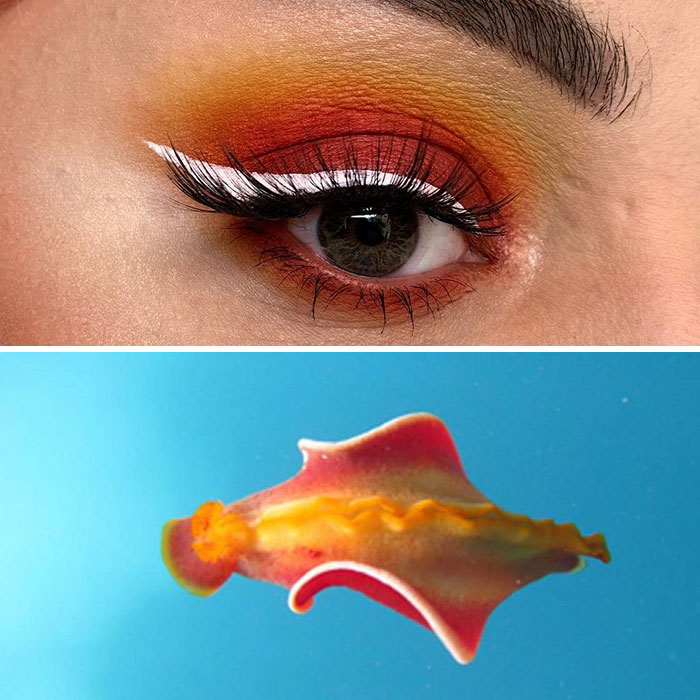
Image credits: Duran Jay / Entomakeup
from Bored Panda https://bit.ly/3ADaTxu
via Boredpanda